Archives
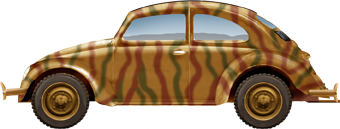
 Vw Typ 87 Kommandeurswagen (1940)
Vw Typ 87 Kommandeurswagen (1940)
18.11.2026 The Volkswagen Typ 87 Kommandeurswagen, is a World War II, four-wheel-drive light vehicle, a car derived from the KDF, at the origin of the legendary Volkswagen "Beetle" from 1934 to 1939. This 2/x4 staff car was produced from 1941 to 1944 in a first military version by the Volkswagen plant for high officers of the Wehrmacht. The waffenamt classified it as the "Kommandeurswagen", but more precisely as the "leichter geländegängiger PKW, 4-sitziger, 4-radgetriebener Geländewagen Typ 87".
Which translates at "light off-road passenger car, four seat, four-wheel drive offroad vehicle Type 87". After the KDF was abandoned in 1939 due to war production, Porsche used the chassis of the Type 82 Kübelwagen and mixed many elements of the VW Typ 166 Schwimmwagen. In all, 564 Kommandeurswagen were produced as VW. It was stopped in 1944 due to allied bombardments. By November 1946 under British control, the plant resumed production from spare parts from stores, making two prototype that granted the company greenlight to relaunch civilian mass production and the iconic "Beetle" we know today... after a first false start under the Swastiska.
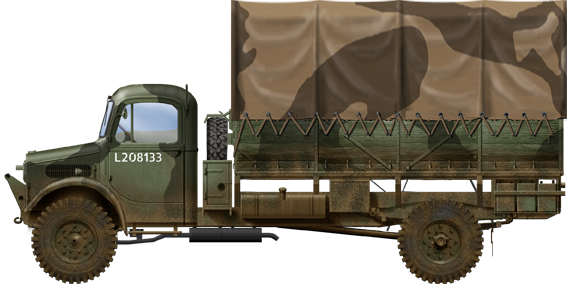
 Bedford OY (1939)
Bedford OY (1939)
11.01.2026 The Bedford OY, especially its transport variant OYD was the mainstay of medium British trucks in WW2, present on all fronts from 1939 to after the Korean War. This army lorry was designed by Bedford specifically for the British Armed Forces when introduced in 1939, based on the civilian O-series but with a modified front end, and single rear tyres. The 3-ton payload OYD was the general service vehicle by far th most common, with the tanker OYC coming second. These vehicles were widely during and after World War II, superseded by the Bedford RL.
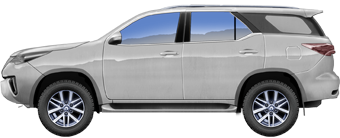
 Toyota Fortuner (2004)
Toyota Fortuner (2004)
04.01.2026 Toyota split its markets according to the respective audience of its 4x4 vehicles, the Hilux for the US market, and based on it, the Fortuner for Asia. Also known as the Toyota SW4, this mid-size SUV manufactured since 2004 featured two/three rows of seats and selectioable rear-wheel/four-wheel drive configuration. Intended for the civilian market, many were chosen by various police services in Asia and beyond, including the Indian Police in Kashmir when a few were lost in action.
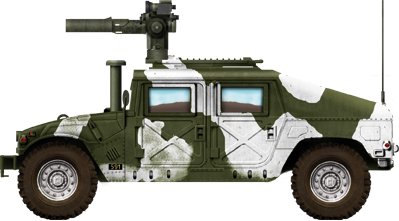
 Humvee (1984)
Humvee (1984)
28.12.2025 To close 2025 what else than one iconic vehicle that entered service roughly 40 years ago: The HMMVW or "Humvee", more officially the "High Mobility Multipurpose Wheeled Vehicle" initially designed to replace the aging Jeep in the American military and a whole range of utility vehicles that followed of the Korean and Vietnam war. The Jeep served U.S. troops well over its four decade tenure, but it desperately needed an update. The Humvee would become the modern day Jeep. Thus post is about the early and in general all softskin (non-armoured) versions. The Humvee had been declined into about 60 versions for the US Army alone and largely exported abroad. It became a familiar face in the Gulf War but the among war of Afghanistan and Iraq revealed its limitations when facing IEDs and mines. It was gradually replaced by MRAPs and a new program, and passed on to the National Guard, the Civilian Market, and massively exported.
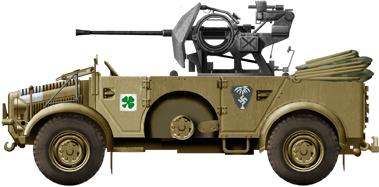
 Horch 108 (1935)
Horch 108 (1935)
23.12.2025 Horch Zwickau started production of the heavy cross-country standard staff vehicle Horch 108 in 1937, and until 1942 delivered a total of 8,135 in five different versins (Kfz). That included 1901 of the EG Typ from Ford Köln. That large 4x4 "staff-car" was on the upper scale in the Werhmacht inventory and could accomodate as much as 8 men. Here is an overview of all the variants and military designations (Kfz.). This was considered as the Schwerer geländegängiger PKW, or heavy staff car, in 2x4 or 4x4 configuration, 8-passenger kubelwagen often used as personal and light arty towing vehicle, found on all fronts in WW2.
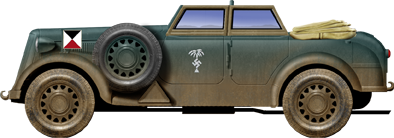
 Alfa-Romeo 6c 2500 Coloniale
Alfa-Romeo 6c 2500 Coloniale
14.12.2025 Alfa Romeo 6C 2500 Coloniale - 1939. This car, unlike the Lancia Aprilia and the FIAT 508 CM, was created specifically for use in the colonies. In 1938, the Ministry of War issued a specific request to Alfa Romeo. During the development phase, two prototypes were sent to East Africa to fine-tune the carburetion at 2,000 meters and check the oil cooling system. The car's very first use was in the Addis Ababa area. This car also derived from the series production Alfa Romeo 6C 2500 (Sport and Turismo versions) and was used by the highest military and government authorities. It remained in service until 1955.
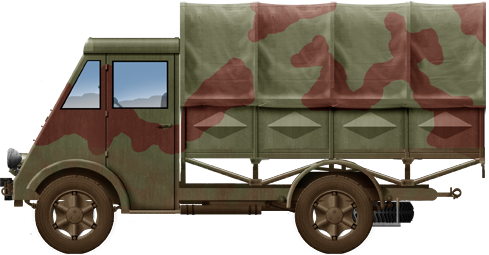

 Renault AHS
Renault AHS
07.12.2025 The Renault AH series were light to medium-duty trucks (three chassis) produced by Renault between 1941 and 1944, under the German occupation and supervision and after the liberation until 1947 at Boulogne-Billancourt, Paris. First update on this post, mostly illustrations, the Renault AHS which was the smallest in the series, a 2t payload lorry. Series production started from August 1941 until March 1944 to 7,985 units. It had a cab and dropside platform, wooden or metal bin walls, roll bars and tarpaulin, 1937 Renault Primaquatre 603 4-cyl. petrol 2,3L 46 hp. Most produced of all three variants. Three illustrations to go with it.

 Iranian Trucks
Iranian Trucks
30.11.2025 The Iranian Zoljanah is a ten wheel drive, highly mobile heavy truck designed and built in Iran. It is used to carry the Bavar 373 air defence system which includes the Fakour command and control system. his has the ability to collect information from all sources relevant to air defense, including passive and active military radars (such as the Mersad), signal surveillance, missile systems and command and control systems. This is a super-heavy truck produced by the Islamic Republic of Iran Army Ground Forces and was introduced in 2014 by Ahmad Reza Pourdastan, the then commander of the Nizaja. To date, two units of this powerful truck have been manufactured and delivered to the armed forces of the Islamic Republic of Iran Army.
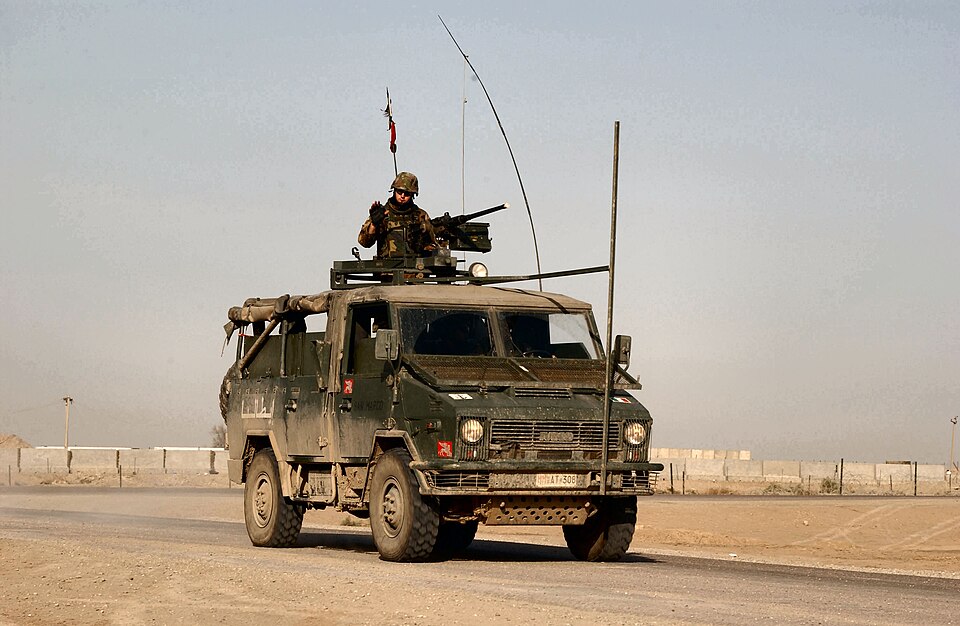
 Cold War Italian Trucks
Cold War Italian Trucks
23.11.2025 Italian trucks of the Cold War era, so roughly late 1940s–early 1990s covering military and key civilian models that shaped Italy’s transport and defense sectors: Italy’s truck industry during the Cold War was dominated by a few major manufacturers—FIAT, Lancia, OM, Iveco (after 1975), and Astra—which produced both civilian commercial trucks and specialized military vehicles. Many of these vehicles were exported widely or used within NATO (Work in progress).
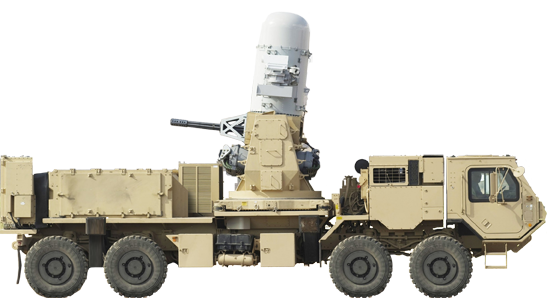
 Centurion C-RAM (2004)
Centurion C-RAM (2004)
16.11.2025 The Centurion C-RAM, also called the Land Phalanx Weapon System (LPWS), is an American Counter-Rocket, Artillery, and Mortar (C-RAM) air defense artillery system. The system was developed in 2004, during and after the Iraq War identified a weakness in ground-based anti-projectile artillery. The system is produced by Northrop Grumman, Raytheon, and Oshkosh Corporation and is deployed on a trailer or more generally on the Oshkosh Heavy Expanded Mobility Tactical Truck (HEMTT) with an integrated generator and cooling system.
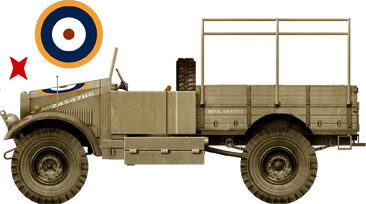
 Morris C4 (1942)
Morris C4 (1942)
09.11.2025 After the CS8 and PU created especially for the army were mass produced but by 1941 their age started to show. In 1942 Morris replaced them by a unitary model called the Commercial C4, based on the CS8 model, notably for its back axle and body, single piece windscreen and fully-featured doors, produced until the end of 1944.

 Steyr 640 (1935)
Steyr 640 (1935)
02.11.2025 The Steyr 640 (1937) was the main 6x4 lorry of the Austrian Army, with a 1.5 ton payload, produced until 1941 to 3,780 vehicles total, mostly for the Wehrmacht after the Anschluss. It was also declined into a field ambulance as the Steyr 643 Krankenwagen (Kfz.31), the Funkwagen, and a 6x4 staff car, Kfz.21 Komandeurwagen. Largely seen as obsolete after 1941 it was repaced in production by the standardized 4x4 lorry Steyr 1500 A/2000 A (type 270) until 1945 which shared the same chassis and many elements with the Type 274 Kubelwagen (c19,000 made combined).
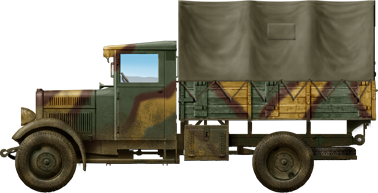
 Polski-Fiat 621 (1935)
Polski-Fiat 621 (1935)
26.10.2025 The Polski Fiat 621 was a Polish 2.5-tonne truck, most prolific lorry of the Polish Army in 1939, built under licence by PZInż but heavily modified to suit Polish weather and bad roads. The 621 L had modified superstructures and the 621 R was a 3-ton capable revised chassis ideal, both sold to the Army and civilian market. The production ran until the German invasion of September 1939. Those not destroyed in the fighting were either captured by the Germans and Soviets but many also fled south, to Romania and were incorporated into the Romananian army fighting on the eastern front.
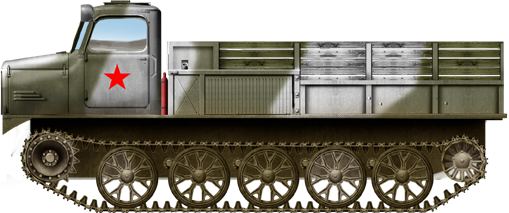
 ATS-59 (1959)
ATS-59 (1959)
19.10.2025 The ATS-59 (Artilleriyskiy Tyagach Sredniy/Артиллерийский Тягач, Средний), meaning medium tracked artillery tractor, entered service in 1950 to replace the AT-S. It was defined in 1950 to be able to tow trailers or weapons up to 14 tonnes, and with a payload of 3 tonnes including ammunition and supply. Towed ordnance was the 130 mm M-46 field gun and 100 mm KS-19 air defense gun. In due time, the ATS-59 was replaced in turn by more economical and faster 6 x 6 all-terrain vehicles... After a series from 1959 to 1967, the ATG-59G was produced from 1970 to 1988.
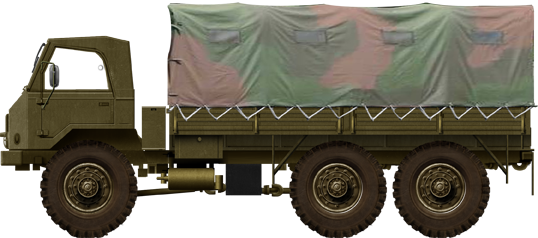
 TAM-150 (1979)
TAM-150 (1979)
12.10.2025 The TAM 150 is a medium military truck developed in the former Yugoslavia, in service with the Yugoslav People's Army (JNA) and armed forces of the successor states of Serbia, Croatia, Bosnia, among others. It was Manufactured by TAM (Tovarna Avtomobilov Maribor) in Slovenia from 1979 to the 1990s. This 3-ton 6x6 military transport truck was a direct development of the 4x4 TAM-110, sharing any parts, declined into many versions including two rocket launcher versions. They passed onto successor states and the chassis was used for the BOV APC.
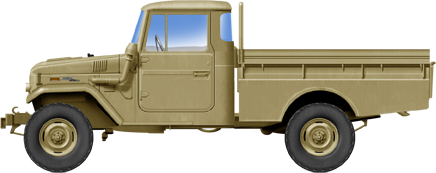
 Toyota JF-45 (1960-80)
Toyota JF-45 (1960-80)
05.10.2025 Toyota disrupted the 4x4 maket internationally with the J2/J3, in the 1950s already, from a US Army demand to take part in the production of the mythical jeep. However a gradual redesign process resulted in an iconic and memorable look, defining the Land Cruiser for the next two decades. The J4 simply had a longer wheelbase, new cabin, new engine and innovated in many ways. By the end of its production run, there were four wheelbase lengths in the J4 family. It was amazingly popular in rural areas throughout Africa, Australia, Americas and Asia, for camping, public transportation and utility transport in inaccessible areas. The J45 was a development of that lineage.
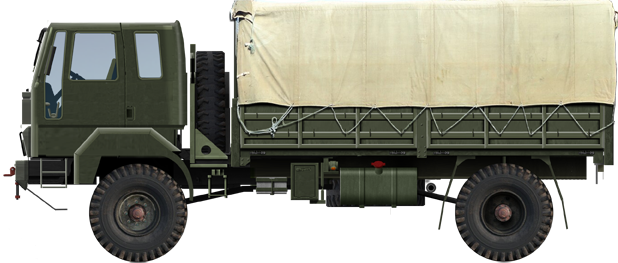
 Ashok Leyland Stallion (2010)
Ashok Leyland Stallion (2010)
28.09.2025 The Stallion range of 4x4 military trucks manufactured by the Vehicle Factory Jabalpur (VFJ) with Armoured Vehicles Nigam Limited is an essential part of the Indian Armed Forces. With over 70,000 Stallions this is the backbone of the Indian Army logistical train, inclusing many used by ITBP. They were delivered in a wide range of configurations by 2010, replacing gradually the Shaktiman trucks. The vehicle was also largely exported and gave birth to the Kavach armored personnel carrier while Panhard created the TC54 on the same chassis.
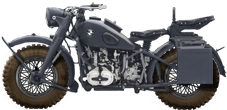
 BMW R75 (1940)
BMW R75 (1940)
21.09.2025 The BMW R75, alongside the Zündapp KS 750, were two off-road side cars mass-produced duting the second world war, used by all three branches of the Werhmacht, sharing a lot of components. The reason why both were produced side by side was that BMW refused to produce the bid winner's Zündapp KS 750's model under licence, arguing its own model was better. Both were assigned to Aufklärungsabteilung attached to all divisions, infantry, motorized or panzer of the Heer. This was a very influencial model also produced by USSR and copied by the Chinese. Iconic, the R75 is today still highly prized by collectioners.
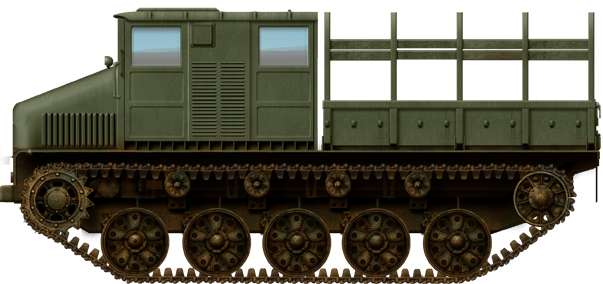
 Mazur D-350 (1958)
Mazur D-350 (1958)
14.09.2025 The Mazur D-350 was the main Polish tracked artillery tractor (registration number UAK 5419) from the late 1950s. About 1,000 were manufactured and it was used also by Czechoslovakia and exported abroad, based on many elements from the T54A tank manufactured in Poland. It remained in service until the fall of USSR.
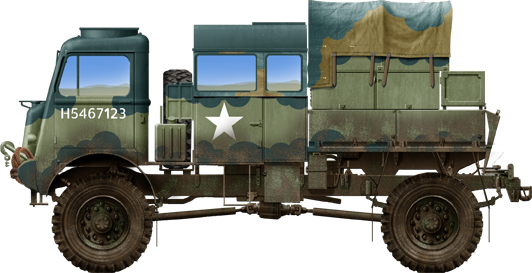
 Bedford QL series (1941)
Bedford QL series (1941)
31.08.2025 The last of the three main Bedford military trucks type of WW2 was also the only one truly tailored as a 4x4 for military needs. The other two, the light MW lorry and the OX/OY were militarized civilian models ready by 1939. At the start of WW II, Bedford was contracted by the British War Office to produce a standard, 3 ton 4×4 general service truck. Its pilot was ready in February 1940 with production launched on March 1941 and running until 1945 as Bedford's first series specific to the military. It was declined into the QL1, QLB, QLC, QLD, QLR, QLT & QLW, with the troop carrier QLD. Illustration: Bedford QLB.
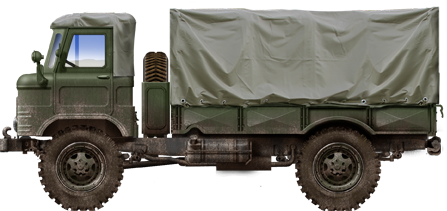
 GAZ 66 (1964)
GAZ 66 (1964)
24.08.2025 The GAZ 66 was a 4x4 light military truck produced by GAZ, deployed as a main cargo vehicle for motorized infantry in the Soviet Army, notably to replace the GAZ-63. It is still used in many former Soviet Union countries and other armies. Nicknamed "shishiga", "shisharik" ("trueman" in Siberia) it was fielded after a development started in 1959 and in service from 1969, with the development team receiving an award. Almost one million were manufactured in 1994 for military and civilian use. Production really ceased in 1999 and the GAZ-3308 was produced instead.
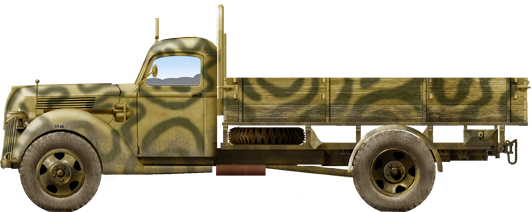
 Ford V3000S (1939)
Ford V3000S (1939)
18.08.2025 The Ford V 3000 and Ford B 3000 were series of 3-ton class trucks built by the German Ford-Werke AG at Cologne-Niehl during the Second World War. At the start of the war, the B3000 and V3000 were part of the standardized german military trucks, with the Magirus S 3000, Mercedes L 4500 S and Opel 3Tons (the legendary Blitz). The name derived from the payload's total weight, in Kgs. It derived from the Ford G 987 T (4-cylinder) or 3t model 1939 by its new streamlined bonnet and from the US model by its unitary windshield. About 25,000 were manufactured until 1945 and the serie went on postwar until closed in 1948.
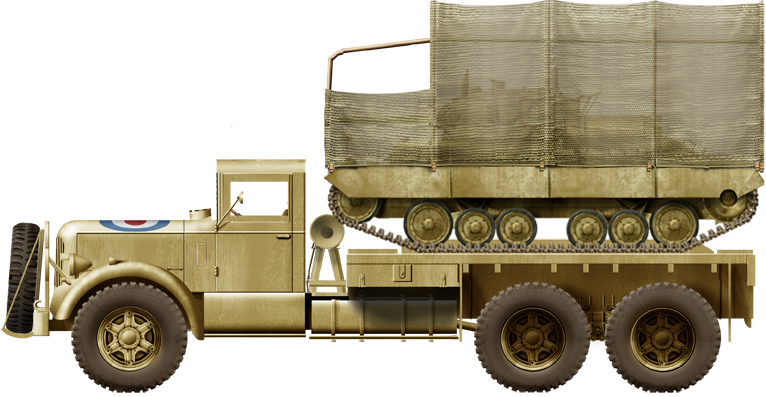
 MACK NR (1942)
MACK NR (1942)
10.08.2025
The Mack NR was a heavy 6x4 cargo truck designed and produced from 1942 by U.S. manufacturer Mack Trucks. It was used first, and mainly by the British Army to transport cargo and materiel over long distances, starting wih the Tunisian Campaign, Sicily, Italy, and in Europe from D-Day onwards. The official U.S. Army designation was: Truck, 10 ton, 6x4, Cargo and Mack G-number was G-528. Over 16,000 were manufactured until V-Day, declined in many versions, and postwar it was still used for almost two decades by the Netherlands, France and Belgium (also Denmark and others when resold).
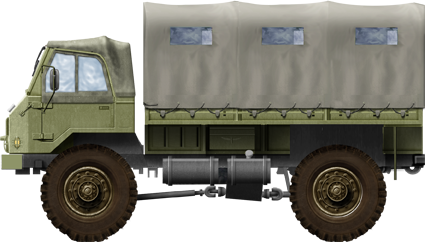
 TAM-110 (1976)
TAM-110 (1976)
03.08.2025 The TAM 110 is a military truck developed in the former Yugoslavia and used primarily by the Yugoslav People's Army (JNA) and later by the armed forces of the successor states (Serbia, Croatia, Bosnia, etc.). Manufactured by TAM (Tovarna Avtomobilov Maribor) in Slovenia its production Period was between the 1970s and 1990s. This 1.5-ton 4x4 military transport truck was a 4x4 (All-wheel drive) powered by a Deutz air-cooled diesel engine such as the F6L 413 rated for 120 hp (varies), combined with a manual, 5-speed gearbox...
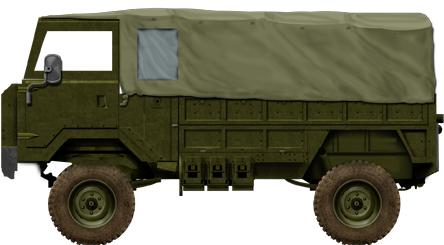
 Land Rover Serie IIA FC (1962)
Land Rover Serie IIA FC (1962)
27/07/2025 The Land Rover Serie II FC ("Forward Control") is a rather unique truck built on the basis of the legendary Land Rover off-road utility Car. The initial IIA had a 2.25-litre petrol engin and LWB 109 in (2,769 mm) chassis, with cab positioned over the engine for more load space. Export vehicles had the 2.6-litre petrol engine and ENV (heavy duty) rear axle. They also had larger tyres with deep-dish wheel rims on the rear axle. They remained still underpowered for a 1.5 long ton payload. 2,500 were manufactured from 1962 to 1966 as troop carriers for the british Royal Army, then until 1974 superseded by the YYB FC with a more powerful 2.25 liters diesel. They were retired in the 1990s.

 HEMTT M983 (1982)
HEMTT M983 (1982)
20.07.2025 The Heavy Expanded Mobility Tactical Truck (HEMTT) is a family of 8x8 diesel-powered, off-road capable military trucks used primarily by the United States Army. Built by Oshkosh Corporation, the HEMTT has been in service since the early 1980s and plays a crucial logistical role in transporting ammunition, fuel, cargo, and equipment across difficult terrain in support of frontline units. There are about a dozen main version and a hundred sub-versions for over 35,000 made since 1982, many rebuilt, modernized and refurbished, plus the model was exported to 21 customers and saw action in Ukraine recently among others.
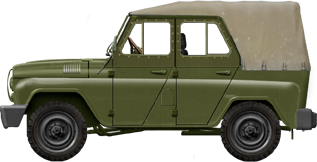
 UAZ 469 (1972)
UAZ 469 (1972)
13.07.2025 The UAZ-469 is a Russian, ex-Soviet off-road vehicle developed in the late 1960s for the military to replace the GAZ-69. Serial production started in 1972 and lasted continuously until 2007, restarted for the provate sector in 2010 at the Ulianovsk plant. Powered by a single R4 2.4 liters engine rated for 70 hp with a 4-speed manual gearbox and all-wheel drive it had more power, better suspension, while still amazingly rugged, reliable and dirt stupid to maintain. of the entire structure. Deployed with the Soviet Army and Warsaw Pact troops as well as numerous uniformed services of communist countries in the Cold War it was also largely exported and was featired in almost every armed conflict after 1970. Its most famous deployment by the Soviet Union was in Afghanistan in 1979-1989. It's mostly veterans nostalgy that pushed to resume production. Today a used UAZ-469 is worth 5,000$ on the market in relatively good conditions.
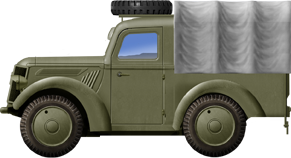
 Type 95 Mini Truck
Type 95 Mini Truck
06/07/2025
This was a light utility vehicle used by the Imperial Japanese Army during World War II. It featured a 1.3-liter, four-cylinder engine, and was designed for reconnaissance and transport. Its durability and versatility made it essential for military operations. The vehicle was also powered by a 33 HP 2-cylinder engine and the same all-wheel drive on both axles as well as being able operate in winter conditions. Type 95 Mini-truck was the truck version of Type 95 Passenger Car "Kurogane". It was also used by the IJN. It was used at first for the Kwantung Army stationed in Manchuria, and produced by Nihon Nainenki.
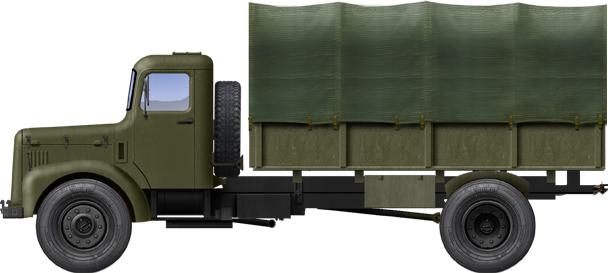
 FAP-13 (1962)
FAP-13 (1962)
29.06.2025 The FAP 1313/1314 and following, initially designated as the FAP 13, is a two-axle cargo truck produced at the Priboj Automobile Factory from 1962 until 2003, when the last 1414 was produced. It is the most recognizable and most mass-produced model in the history of FAP. Many were used for various military adaptations during the Yuoslav wars in the 1990s. Some were even used as bases for improvized armoured cars.
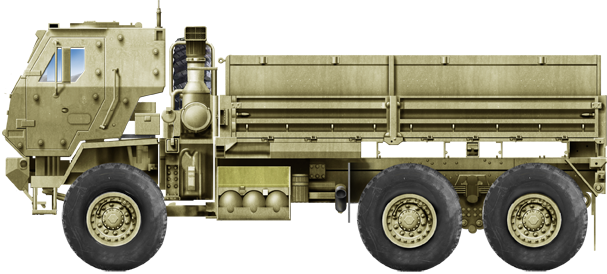
 MTV M1083 (1990)
MTV M1083 (1990)
23.06.2025 To start a long series of updates on the current light to medium military trucks of the current US Army, which just celebrated its 250th anniversary, here is the FMTV since 1990. In this family, we will start with the M1083, probably the best known of them all. But all variants will be seen over time, namely the M1078-M1096 as well as the M1140, M1147, M1148, M1157, as well as XM1160 prototype, Mongoose MLC project and the M1273 A1P2 MTV. So many upgrades to come for the largest post on truck encyclopedia since the Opel Blitz and Canadian Pattern.
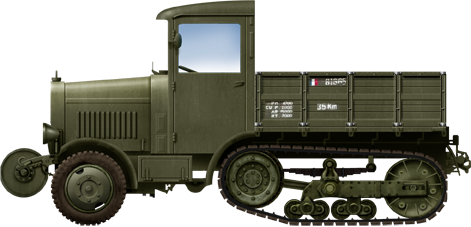
 Somua MCG (1932)
Somua MCG (1932)
15.06.2025 The Somua MCG is a semi-tracked artillery tractor, designed for the French Army by the Société d'outillage mécanique et d'usinage d'artillerie (SOMUA) from 1928, in service from 1931. It was developed at first as a recovery tractor, then declined into a main artillery tractor and ammuntion supply vehicle (MCG 5/MCGS 4/11), with 657 MCG-5, 315 MCG-4 & 11 and 440 ARV produced until 1940. It was used during the Second World War by France, Greece (produced there) and many reused later by Germany, some declined as armoured combat variants by Baukommando Becker in 1943-44.
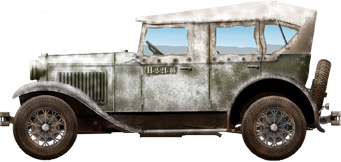
 GAZ-A (1932)
GAZ-A (1932)
10.06.2025 The GAZ-A is a passenger car mass-produced from 1932 to 1936, first passenger car produced in the Soviet Union, near-exact copy of the Ford Model A from 1930. The "Gazik" was popular with the citizens wealthy enough to afford one, and by 1935, 100,000 had been built at GAZ, including light lorries and pickups. The contract between Ford and the Soviet Union was dissolved by mutual agreement and in 1936, production ended after 41,917 cars alone in favor of the improved GAZ-M1. Some were used by the Red Armt as staff cars, but they lacked 4x4 capabilities.
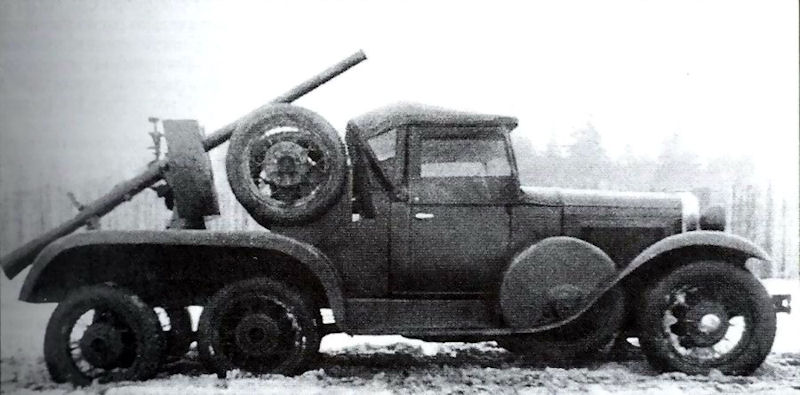
 GAZ-TK and other Soviet Trucks of the Interwar
GAZ-TK and other Soviet Trucks of the Interwar
08.06.2025 Major update of the Soviet Trucks in WW2, Part I: Staff Car and GAZ Trucks. The full monty: GAZ-A, GAZ TK, GAZ M1, GAZ 61, GAZ 64, GAZ 67, GAZ AA, GAZ MM, GAZ AAA, GAZ BZ-38, GAZ-60, GAZ-65, YAG-6, YAG-10.
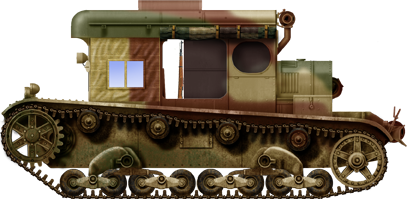
 C7P (1934)
C7P (1934)
01.06.2025 The C7P, standing for "Ciągnik Siedmiotonowy Polski" or "7-tonnes Polish Tractor" was a Polish tracked artillery tractor of the Polish Army which production started in 1934, largely based on the 7TP light tank, itself based on the 1931 Vickers E (6 tons). It was designed in 1931-32 by Witold Jakusz from PZInż and was built at the Ursus factory until September 1939 with a total of 151 delivered or in park, and 108 in active units when the invasion started.
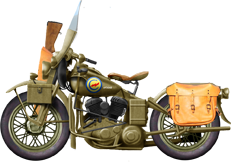
 Harley-Davidson WLA
Harley-Davidson WLA
25.05.2025 First motorcycle here on truck-enclycopedia, yes it's seems a bit off-topic but actually the website is about ALL military softskin vehicles, so its also comprised, as announced from the start also tractors, staff cars, down to ultra-light tricycle, and of course motorcycle and side-cars that also part of the military in several wars. So here you go, for a start on motorcycles, what else that a most legendary brand of all (With perhaps Triumph on the other part of the pond and Kawasaki further away)... The Harley Davidson history with the US Military dates back all the way to 1916 and the expedition to find Pancho Villa, up to 1998 and the Military Police's MT series. In this serie, the first obvious model of note is the WW2 Harkey-Davidson WLA "Liberator" with 100,000 produced from 1940 to 1952, used in WW2 on all fronts, Korea and Vietnam.
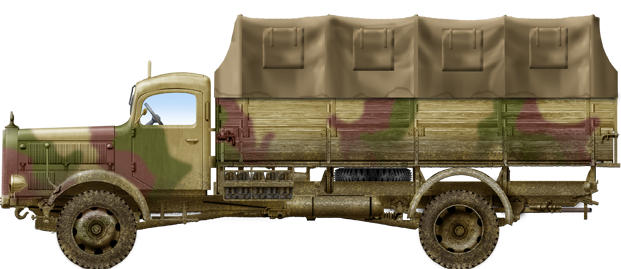
 Mercedes L4500
Mercedes L4500
18.05.2025 The Mercedes-Benz L 4500 was a heavy duty truck manufactured from 1939 to 1944 in Gaggenau and then in 1944–1945 by Saurer due to allied bombings. This truck was a long-bonnet model using a rear-wheel-drive for the L 4500 S or all-wheel-drive on the L 4500 A, then half-track "Maultier" with the L4500R, using a Panzer II track system. The Wehrmacht used the L 4500 with armoured cabins as Flak trucks also during the war, as heavy AA truck with 50 mm or Flakvierling mounts. Due to the shortage of materials there was a last simplified variant which sported the Heinheit wooden cabin, standardised as the mudwings from 1943. One of the chassis derivatives was the Sonderkraftfahrzeug 4 rocket launching half track. The production of the L4500 resumed postwar and until 1954 when replaced by the L 312 (1953-1961).
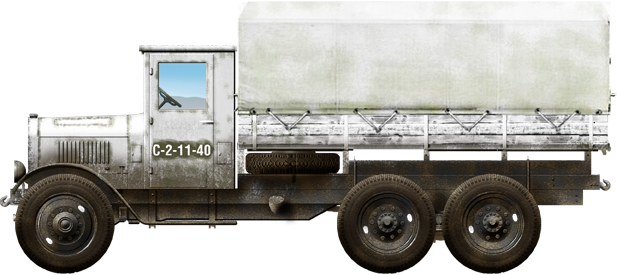
 YAG-10 (1932)
YAG-10 (1932)
11.05.2025 The complete story of the Yaroslavl YaG-10 truck, its development as a 6x4 heavy truck, limited production and variants, including the 29K FLAK vehicle with a 76.2mm gun. The 6x4, 8-ton YaG-10 truck was produced from 1932 to 1940 with 333 made, including 61 converted into 29-K AA trucks. The small production was due to its US-supplied engine, the Hercules-YXC and 4-speed Brown-Lipe-554 manual gearbox, the British suspension from Moreland. So this was an anecdote in an interwar and wartime production or mass deliveries of lend-lease trucks, but a first attempt at producing a fully domestic heavy truck in USSR nonetheless.
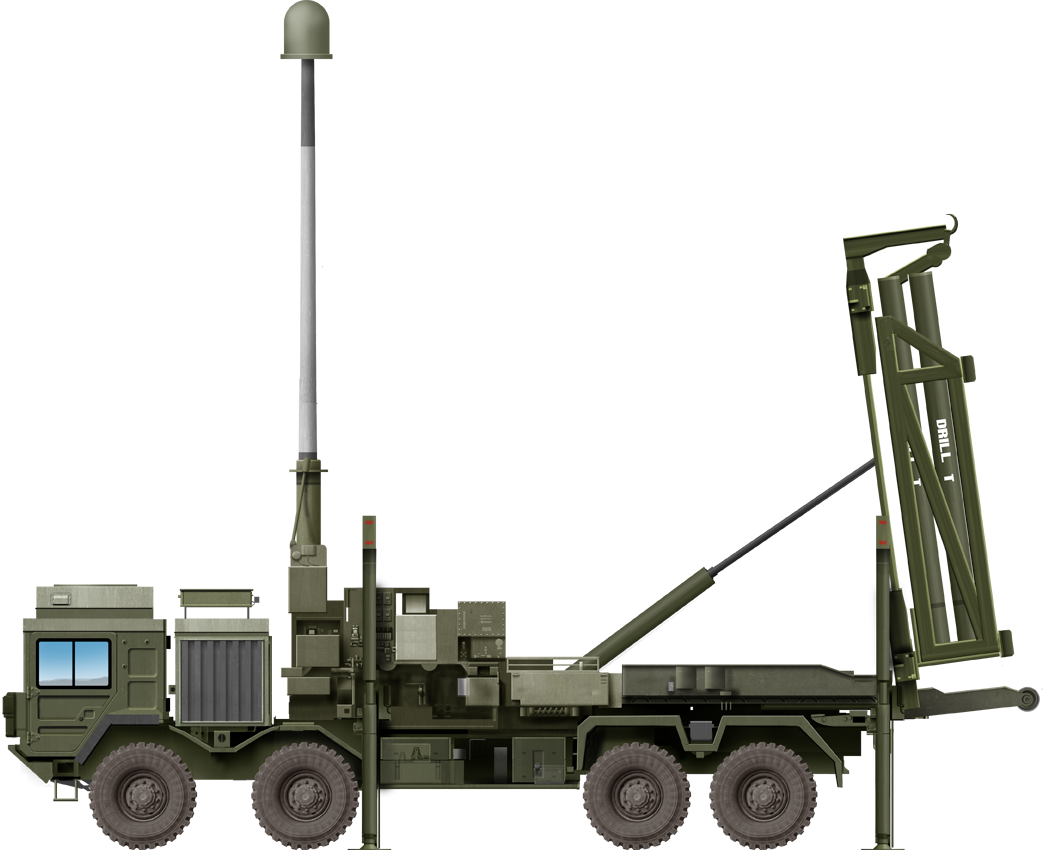
 MAN SX-45 Sky Sabre (2000)
MAN SX-45 Sky Sabre (2000)
04.05.2025 Sky Sabre, replacing its predecessor Rapier, is the latest high mobility British air defence missile system, comprising of three separate motorized components: The radar, command and control and missile vehicles. It can control the flight of 24 missiles simultaneously whilst in flight, guiding them to intercept 24 separate targets. The launching vehicle and the radar vehicle are both based on the 8x8 MAN SX 45 under licence. They are expected to operate at distances of up to 15km apart.
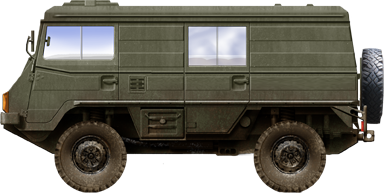
 Pinzgauer 710 (1971)
Pinzgauer 710 (1971)
27.04.2025 The Steyr-Puch Pinzgauer was developed from the late 1950s 600kg 4×4 light military multi purpose offroad vehicle called the Haflinger. The new 1970 model was heavier, but had a much larger payload making it a more versatile 4x4 vehicle. This model was the Pinzgauer 710, declined into a soft top, hard top, flatbed carrier and ambulance. This was an instant success, and it was readily adopted from 1973 by the Austrian Army and widely exported soon. First update on a serie. Next: Pinzgauer 712, 716 and 718.
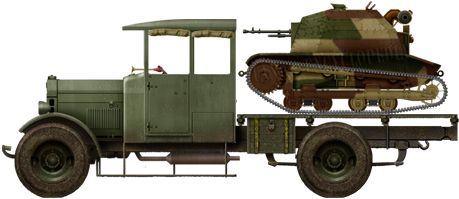
 Ursus A (1925)
Ursus A (1925)
20.04.2025 The Ursus A was Polish Miliitary Light Truck, the first built in Poland, as a license-built modification of the Italian SPA 25C Polonia. This was a gradual process, with the SAP 25C being purchased, then assembled, then built locally in 1928-1931, as the Ursus-A, differing in some points. It was replaced by the Polski Fiat 621, but many were still active in 1939.
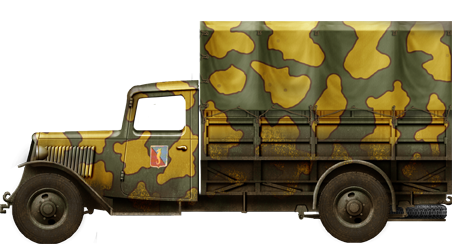
 Citroën Type 23 (1935)
Citroën Type 23 (1935)
13.04.2025 Not as famous as the prewar Citröen Traction Avant or postwar 2CV and DS, the Citröen Type 23 was nevertheless the working horse of the French Army in May-June 1940 after some 13,000 were delivered, when ordered in emergency by September 1939. This solid design emerged in 1935, designed by Flaminio Bertoni as a general purpose 1.5 tons 4x2 truck. Far more were made for Civilian service (perhaps as much as a million until 1969, completely restyled in 1958). In 1940 alone, there were some 200,000 vehicles, in civilian and military service. Some 6,000 were captured and reused by the Germans, added to more than 7,000 produced into improved variants until 1944.
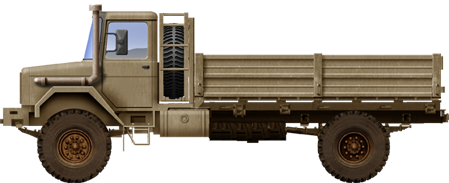
 SAMIL 50
SAMIL 50
06.04.2025 The SAMIL ("South African MILitary") 50 was developed as a medium truck capable of transporting a 5-tonne load off-road, usable on dirst roads and savannah tracks of southern and eastern Africa. It was developed from the Deutz F6L 413F 6. Produced from 1998 onwards, it was declined into the Mark I and Mark II, the latter given a locally produced ADE 409N 9.5-litre V6 diesel. Compared to the original, these trucks were rugged for local conditions, and modified in many details. An armoured variant called the Kwevoel was declined, able to take supplies and men to the front line on mine-infested roads.
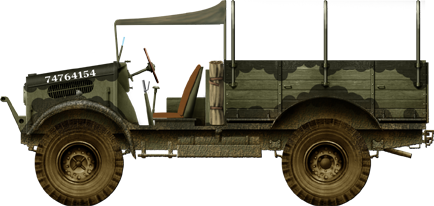
 Bedford MW
Bedford MW
31.03.2025 The Bedford MW was a light general service truck used by the British Armed Forces during the Second World War, with 66,000 manufactured, until 1945. It was studied from 1937 as a prewar emergency production program and produced from 1939 until V-day in an early and late versions. It was one of the most common of the "15 Cwt" used on all fronts, from the French campaign in 1940 to the African, Italian, Northern Europe and Far East campaign, the last soldiering for the crown and country "east of suez" until the 1960s. It was reliable, rugged, easy to maintain, cheap to produce and proved quite adaptable.
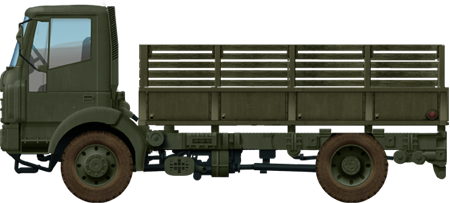
 Iveco Eurocargo
Iveco Eurocargo
27/03/2025 The Iveco Eurocargo is one of the best selling trucks in Europe, launched to replace the Zeta in 1991 and produced since though three generations, the second in 2001 and third (actual) in 2015. It was also an export success, as a tactical light truck, notably to the Bundeswehr, Esercito Italiano and Ejercito de Espana. Today the Eurocargo (commercial name, there are many local adaptations and military desgnations) is distributed via the IDV group as the MLL-110E, 150E, both 4x4 with multifuel diesels.
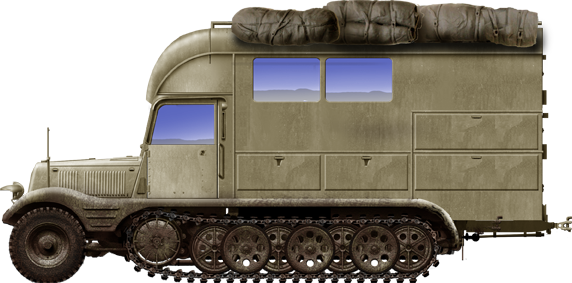
 Sd.Kfz.11 with van bodies
Sd.Kfz.11 with van bodies
23.03.2025 Update: Called Raupenraketenwagen, Raupenfeuerwehrwagen, and Seerettungsfahrzeug (auf 3t Sd.Kfz.11 (Van)) these vehicles were given longer chassis and new enclosed cabins and van box bodies with windows for specific roles, such as the rescue of the shipwrecked, control vehicle for V2 launches of Luftwaffe firemen's main vehicle for combat airfields.
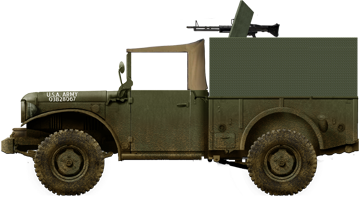
 Dodge M37 (1951)
Dodge M37 (1951)
16.03.2025 The Dodge M37 was a 3⁄4-ton 4x4 truck developed for service in the United States military as a successor to the widely used Dodge-built WC Series introduced during World War II. Put into service in 1951, it served in a variety of configurations in frontline duty in the Korean War and War in Vietnam (among others) before being replaced by the COTS based Kaiser M715 (1967) and direct replacement, the Dodge M880/M890 series (1975). Factory designation was G74. After 1978, except those exported, it saw use with the domestic Federal government agencies (ceded to a symbolic dollar apiece) or auctioned to civilians in the U.S. It was also produced by Canada for a grand total of 115,900 from 1951 to 1968.
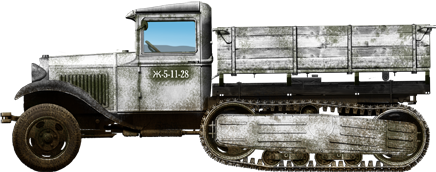
 GAZ-60 (1938)
GAZ-60 (1938)
09.03.2025 Given the climatic and road conditions in USSR it's surprising the Red Army never fielded half-tracks in alternative to its trucks already in the mid-1930s. In 1936 there was still no cross-country transport available en masse from both ZIL and GAZ despite the Kegresse concept was already known. Simple 4x4 and 6x6 trucks derived from US patterns, Ford in particular were mass produced and had to make due to existing conditions and bad roads. Still, from 1936-37 tests were made at NATI, leading to the first Soviet half-tracks trucks in serial production, albeit they gained in traction what they lost in speed and range, being also unreliable as shown by the winter war with Finland. Along with the ZiS-22(M) and ZiS-42, they never were a success.
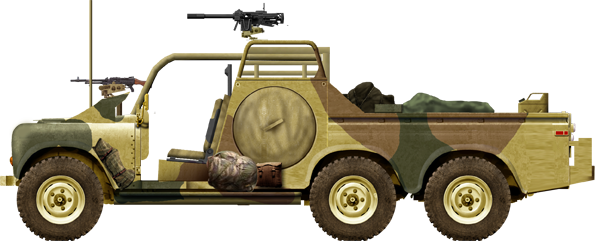
 Land Rover Perentie (1982)
Land Rover Perentie (1982)
02.03.2025 The Land Rover Perentie was a serie of 4x4 and 6x6 Australian built Land Rover designed to replace the 1960s Land Rover series 2A and serie 3. The Perentie program led to the construction of 2500 4x4 and 600 6x6 vehicles built at Moorbank from 1984 to 1992 before the Program Bushranger took over from 1992 to 1998 as an interim before the Bushmaster PMV took over from 1998. Based on the Land Rover 110 and heavily modified, notably for the 6x6, the Perentie is a recoignisable and unique Australian take on the wide Land Rover family.

 2S43 Malva
2S43 Malva
23.02.2025 The 2S43 "Malva" is a recent (2023) 152 mm Russian self-propelled gun mounted on an 8x8 wheeled chassis. It was developed by Burevestnik in Nizhny Novgorod as part of the Nabrosok program to define a brand new artillery park in 2019. In 2021 was created the Uraltransmash chassis adaptation of a BAZ-6610-02 "Voshchina" produced by the Bryansk Automobile Plant. Tests were performed from 2021 to 2023 until acceptation and a curret production, deployed from June 2, 2024 in Ukraine.
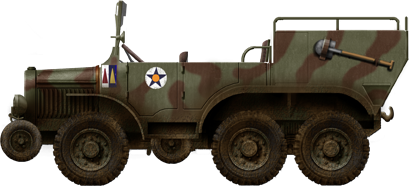
 Laffly S15 T
Laffly S15 T
09/02/2025 The Laffly S15 was a family of all-terrain military vehicles sharing the 6x6 drive chassis and anti-ditching rollers. They were built in the late interwar as a light artillery tractor, used by French forces during World War II. But also declined into specific variants such as the S15R personal carrier, the low-profile
W15T, the S15C ambulance, the W15 TCC tank hunter and its armoured sub-variant prototype of 1940 as well as the S15 TOE colonial armoured car.
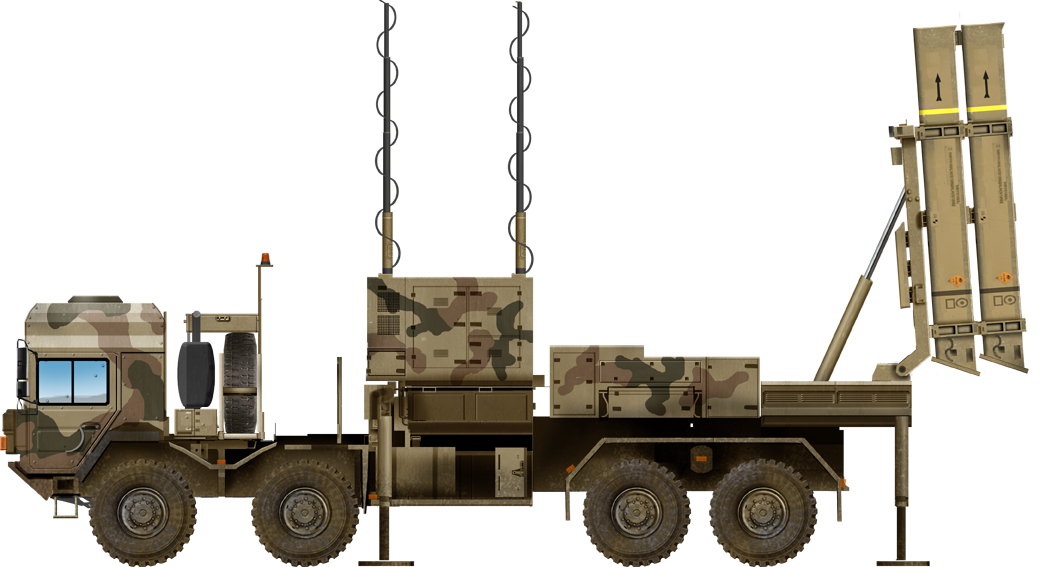
 MAN X45 8x8 IRIS-T
MAN X45 8x8 IRIS-T
09/02/2025 The MAN X45 8x8 is one of the numerous variants of the MAN XS range... Being a heavy duty platform it was declined into many interesting weapons systems. So this post will be updated several times in the future, detailing each variant. Today is the IRIS-I SAM system.
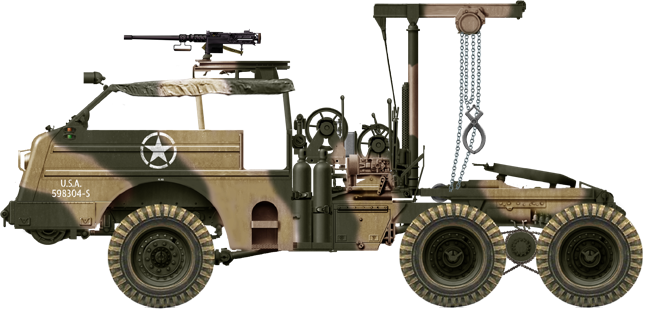
 Pacific M25 Tank Transporter "Dragon Wagon"
Pacific M25 Tank Transporter "Dragon Wagon"
02/02/2025 The M25 Tank Transporter or "Dragon Wagon" was among the heaviest World War II US truck, specialized as 30t + tons tank transport. The M25 combined the M26 6x6 armored truck, powered by a Hall-Scott 440 engine and powered winch plus 10 tons capacity M15 Trailer, and the M26A1 tractor was the unarmoured variant. The latter had no roof but canvas, no side windows but the overhead standing M2 Heavy Machine gun for AA defence. It was also produced by Pacific and saw action postwar in Korea. This updates comprised new illustrations of the M26 and M26A1 in various configuration and additional tactical and technical data.
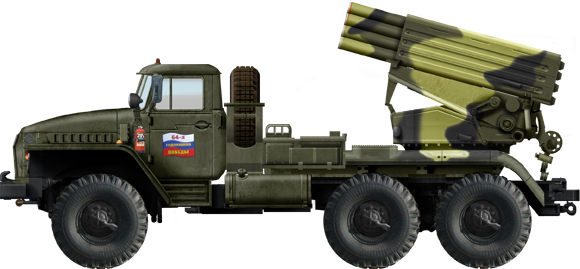
 BM-21 Grad
BM-21 Grad
25.01.2025 The BM-21 Grad is a Soviet-era multiple rocket launcher system that has been widely used and adapted by various nations and armed forces. Introduced in 1963, it fired 40 122 mm rockets fired in 20 sec., mounted on a Ural-375D 6x6 truck in the original version, later the Ural-4320 an others. From 20 it could fired enhanced later rockets up to 40 km and a large variety of warheads such as HE-FRAG, mines and Cluster munitions. Simple to operate and maintain it became the primary way to deliver a massive volume of firepower in a short time. It was declined into the BM-21M, Tornado-G, with Chinese Type 63, Iranian Arash and North Korean variant...
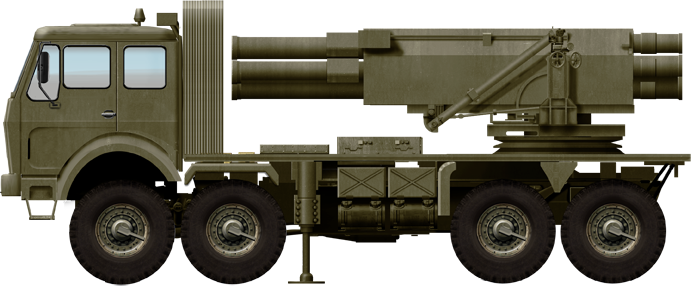
 M87 Orkan
M87 Orkan
19.01.2024 The M-87 Orkan (Serbian: 'hurricane') is a Yugoslavian fully automated self-propelled multiple rocket launcher. The M-87 was a complete weapon system comprising a 12 launch tubes mount on a FAP 2832 truck chasss, with has a range of 50-120 km, and capability to deliver various warheads for a lot of uses on the battlefield. It was a domestic answer to the Soviet BM-21. The production of Orkan M-87 ceased with the breakup of Yugoslavia. In May 1995, the Republic of Serbian Krajina used M-87 Orkan to attack Zagreb, after Croatian forces captured former Serbian territories. They also saw action in the 1991 gulf war, as part the Iraqi army. The vehicle is now rather forgotten and confidential outside the Balkans.
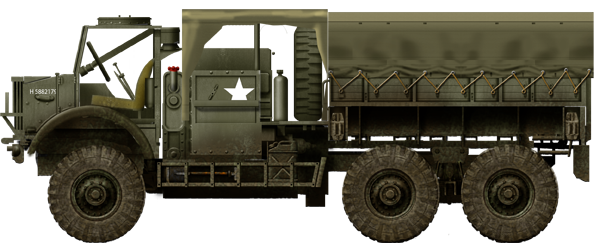
 Albion WD FT15
Albion WD FT15
12.01.2024 The Albion WD.FT15N/NW was a 6x6 development of the WD.FT11N and BY5 as a low silhouette gun tractor with semi-forward control layout to stay below 7 feet 6 inches as main requirement, notably to facilitate shipment. The first was assembled and tested from April 1945 with a EN281 engine, with a 2 speed gearbox with lockable third differential, other features (N) and an optional waterproofing (NW). 500 were ordered in the spring, but only 150 supplied until the order was cancelled in January 1946. It was intended to replace the Albion BY5 produced from 1942.
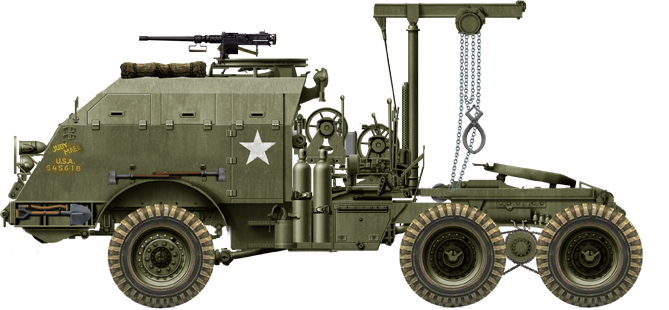
 Pacific M25 Tank Transporter "Dragon Wagon"
Pacific M25 Tank Transporter "Dragon Wagon"
06/12/2024 The M25 Tank Transporter better known as the "Dragon Wagon", was one of the heaviest vehicles used by the United States in World War II. It was specialized transport 30 tonnes+ tanks or other heavy vehicles and just large bulky loads in general. It was a combination of the M26 Tractor 6x6 unarmored truck powered by a Hall-Scott 440 engine for towing heavy loads with a powered winch to loading/unloading and the 10 tons capacity M15 Trailer, a flatbed semi-trailer with ramps and eight roadwheels at the rear. A variant was used to recover disabled tanks and transport them to repair facilities or just move tanks from railway lines to forward positions. There were also semi-armoured or fully armoured variants. This go-to vehicle for the Sherman was developed in early 1940s by Knuckey and mass produced by Pacific Car and Foundry. It was used on the European theater, especially in Italy from 1944 and NW Europe, as well as in some threaters of the Pacific but also postwar in Korea, before being replaced by the M123 semi-tractor from 1955.
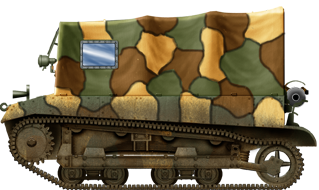
 C2P Tractor (1936)
C2P Tractor (1936)
29.12.2024
The was a Polish light tracked artillery tractor of the interwar, based on the TKS tankette. Prime users were anti-aircraft units of the Polish Army, towing the wz. 36 anti-aircraft guns plus associated ammunition trailers but also various ordnances. However after the defeat of September, the Wehrmacht took over many vehicles, which stayed in service as the artillery-schlepper C2P(p) until 1945. About 350 tractors were manufactured.
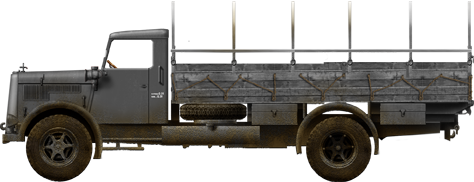
 Autocarro Unificato Pesante O.M. URSUS (1939)
Autocarro Unificato Pesante O.M. URSUS (1939)
22.12.2024
The OM Ursus is a truck produced by Officine Meccaniche (OM) from 1939 to 1941. It equipped the Royal Army and Wehrmacht during the Second World War. It originated in the FIAT (via its subsidiary company OM) medium truck Taurus, declined into a heavy truck, Ursus, both sharing most elements and a fuel injection engine. The chassis was longer on the Ursus, but they had overall an extremely similar aspect. Taurus was the one manufactured in greatest numbers, with a gasoline version produced between 1940 and 1944 and also used by the Italian Royal army and after September 1943, the Wehrmacht. The military version Ursus was produced between 1940 and 1942 and differed in many aspects.
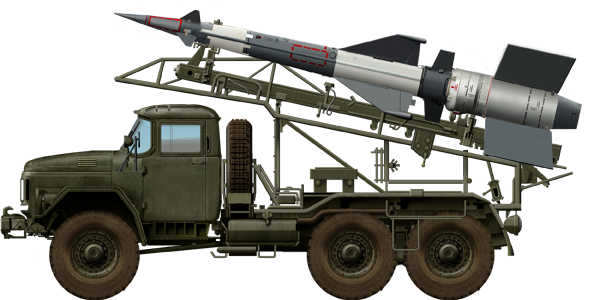
 ZIL-131
ZIL-131
15.12.2024 The ZIL-131 is a robust 6x6 3.5 tons standard medium military truck produced by the Soviet Union between 1966 and 2015 and designed for a variety of purposes. Known for its ruggedness and reliability it was adopted by more than fifty countries and declined into at least ive main variants. Zavod Imeni Likhachova (ZIL) made this vehicle powered by a V8 gasoline engine, 6.0 liters rated for 150 hp and with a manual, 5-speed gearbox with a 2-speed transfer case. The vehicle measured 7.04 m by 2.49 m wide and 2.98 m tall and unarmed. Road payload is 5 tons and 3.5t off-road, towing capacity 6 tons, twin fuel tanks 2×170 liters for a top speed of 80 km/h (50 mph), 800 km road range and capable of climbing a 58% incline. It featured naturally a central tire inflation system ahd had a 330 mm ground clearance. I saw a lot of combat worldwide and is still part of the inventory of most countries, and also widely spread in the civilian market after replacement by the ZIL-4334.
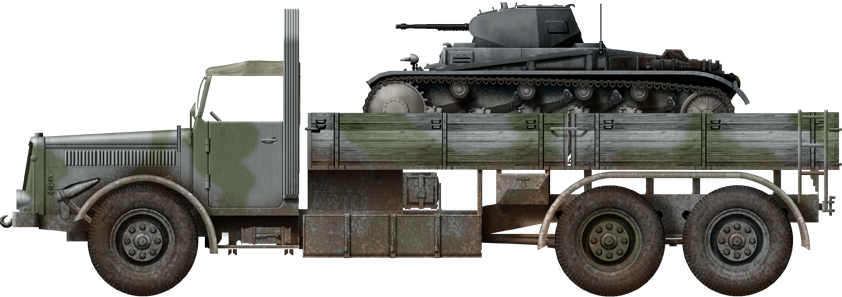
 Faun L900 D567 (1937)
Faun L900 D567 (1937)
08.12.2024 An attempt was made to produce a tank transporter for the PzKpfw I, and for this purpose the 4 X4 version of the 6,500 t Büssing-NAG truck was used, but little progress was made in this direction. The tank transport was carried out on 6 X4 Faun L900 D567s, with a payload of 8,800 t. German industry was never able to supply enough tank transporters and, ultimately, it was the half-track with trailer that took over this role.

 Mack NJU 5-ton 4x4
Mack NJU 5-ton 4x4
01/12/2024The Mack NJU 5-6 ton 4x4 Pontoon tractor (G639) was a semi-tractor (meant for towing a trailer) designed to haul bridging equipment in World War II. The US obtained 700 built total, and from these, 119 were supplied to the British in Egypt, and 8 declined with van bodies, while the rest were used as a "substitute standard" by the US Army. Better known and very close in design were the Autocar U8144T. Both were indeed COE or "cab over engine" tractors, but unlike the Autocar, which production was far more substantial, the Mack tractors only existed as enclosed cab versions.
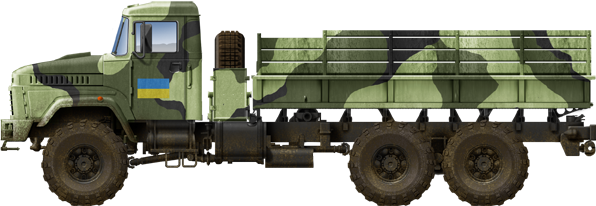
 KrAZ-6322
KrAZ-6322
24.11.2024 The KrAZ-6322 is a Ukrainian off-road six-wheel drive medium truck intended for extreme conditions. It has been produced since 1994 and is manufactured at the KrAZ factory in Kremenchuk. It was first presented at the 1994 defence industry trade show in Kyiv. It is the most common recent truck in service with the Ukrainian army, declined into 12 variants and notably the 2S22 Bohdana self propelled gun.

 BM-30 Smerch
BM-30 Smerch
17.11.2024 The Smerch ("tornado/whirlwind") GRAU designation 9K58 Smerch and 9A52-2 Smerch-M were designed to fire twelve solid-fuelled 300 mm rockets at longer range and with a heavier payload than any other system. These are tailored, depending on their warhead, to defeat personnel, but also soft or armored targets as well as enemy artillery batteries, command posts and ammunition depots. Designed from the early 1980s based on the common MAZ-543 8x8 multipurpose truck platform. The Smerch entered service with the Soviet Army in 1989, first observed in the West in 1983 classified as "MRL 280mm M1983". It was used by Russia (among others) in Chechnya, Syria, Donbass and Ukraine recenty and largely exported or adapted by India and China.
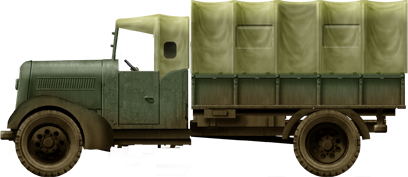
 Isuzu Type 97 (1937)
Isuzu Type 97 (1937)
10.11.2024 The Isuzu Type 97 was based on the TX40, sharing parts common to the Type 94 Truck. The Type 97 could be found in almost all areas of the Pacific war as a principle truck for the IJA until wars end. It entered service in 1937 and was produced until 1945. It was narrow to suit local roads and had high ground clearance to cope with uneven surfaces but heavy with poor payload and high consumption compared to British equivalents.
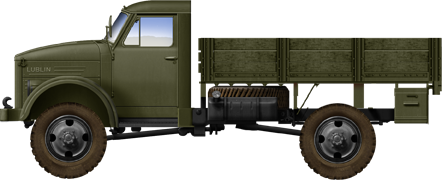
 FSC Lublin 51 (1951)
FSC Lublin 51 (1951)
04/11/2024 The FSC Lublin-51 was a Polish small-capacity licensed version of the Soviet
GAZ-51. Production started at FSC Lublin Automotive Factory on 7 November 1951 and ended in June 1959, replaced by the FSC Żuk. A grand total of 17,479 were produced until 1959, providing the
Polish Army its main supply truck. It was found not satisfactory between its low payload and high fuel consumption.
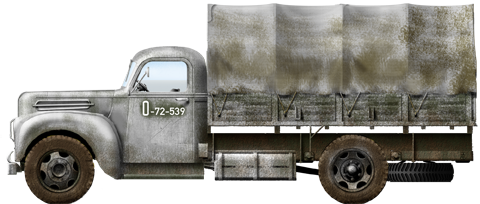
 Ford G8T (1942)
Ford G8T (1942)
28/10/2024 The Ford G8T is part of the "Ford 6" family, known in US nomenclature as the Ford G8T ("Ford-6"), 1½-ton, 4x2, Cargo. It was produced to an extent of 61,000 vehicles, shipped in their immense majority vian lend lease to the Soviet Union form 1943, either via the Arctic convoys (which in case they could welml at the bottom of the sea) or via land, carrying supplies from India and via Iran. In any case, they became the second most common lend-lease allied truck in Soviet service by 1945. It was also paradoxically produced and used by Germany in 1941 as the US were neutral at the time.
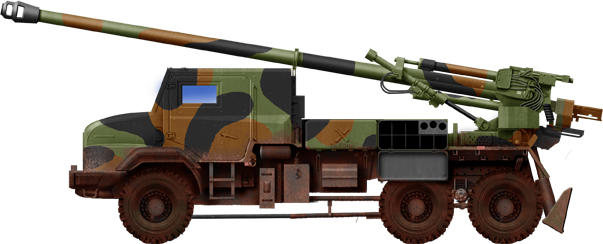
 CAESAR 155mm self propelled howitzer
CAESAR 155mm self propelled howitzer
17.10.2024 In 1991 it was realized that with the cold war over, traditional tracked artillery systems such as the French GTC 155mm AUF-1 were too slow for the new asymetric combat that seems more likely in the next decade. France notably had ongoing deployment in Africa, and took part in the gulf war, Operation Daguet (French part of Desert Storm) without a fast artillery component which could keep up with its ERC-90 F4 Sagaie, 6th Light Armored Division VAB APCs), Foreign Legion AMX 10 RC. The only "compatible" unit deployed was the 4th Dragoon Regiment fielding AMX-30B2 tank in second rank, and the 9th Marine Infantry Division only procuring light artillery units.
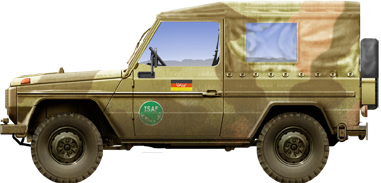
 Mercedes Benz 250 GD & G class (1978)
Mercedes Benz 250 GD & G class (1978)
09/10/2024 The Mercedes-Benz G-Class, also known as the G-Wagon or Geländewagen, was a multi-purpose off-road vehicle in production since 1979. Originally designed as a military vehicle, it became famous for its rugged design and off-road capabilities combining all-wheel drive with differential lock, and high ground clearance. It is still used by a number of militaries around the world, including the German Bundeswehr, for transport, reconnaissance, command and control. The Bundeswehr's 205 GD vehicles are equipped with a winch, all-terrain tires, and communications system and the model had been largely exported to many militaries.
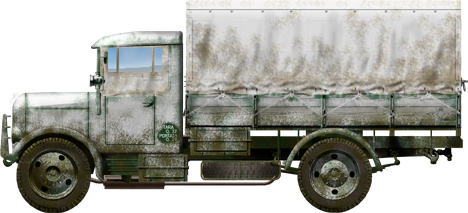
 FIAT-SPA 36R (1934)
FIAT-SPA 36R (1934)
25.09.2024
The SPA-36R light truck was born from the need of the Armed Forces to replace the now obsolete SPA-25 C/10 with studies launched in 1933 for a planned adoption in 1935. It was decided to create a standard declined into two basic models, the popular 38R and the 36R. The difference between the two was a liquid cooled engine for one, and an air-cooled engine for the other. The 36R was supposed to be used in the desert and mountainous areas as it needed air instead of water for the engine to be cooled down. In the first case due to scarcity and in the second, due to frozen water in sub-zero temperatures. It had also a horseshoe radiator grille and redesigned bonnet. However the 36R had little success and was produced in 2500 vehicles from 1934 to 1936, seeing mostly action in Libya in 1940-41, most being lost there.
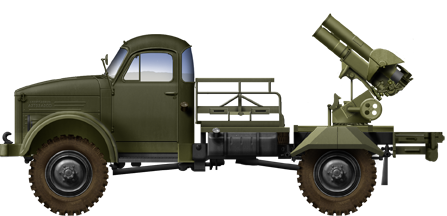
 BM-14
BM-14
14.09.2024 The BM-14 was the name of a weapon system composed of a rocket launcher, either 16 or 17 barrels depending of the type (BM-14-16/17) and improved (M) variants mounted on a veriety of trucks, ZIL-151, 157, 131, GAZ-63A and GAZ-66 for the lighter 4x4 BM-14-17 later variants. It was produced in the thousands to replace the WW2 legacy BM-13 Katyusha systems and replaced gradually in the 1970s by the BM-21 Grad. It was also largely exported and saw combat from the 1960s to in the Middle east to 2013 in Syria, still used by a few countries.
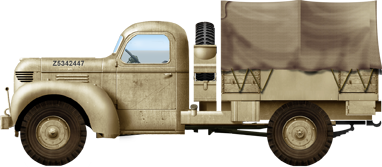
 Dodge D-15 (1941)
Dodge D-15 (1941)
02.09.2024 Used solely for rear transport, the streamlined D-15 was the baselined 3/4 ton rear driving truck used by Commonwealth armies, either through US lend lease or Canadian built. They were mostly used in North Africa, Italy and UK and saw little service in the northern European campaign supersded by larger or 4x4 models, notably the CMP series from Canada, all 4x4. Nevertheless, the Dodge D-15, produced from 1945 to 1947 as the WD-15 pickup truck were very popular for their reliability and soldiered on in many parts of the world until the 1980s.
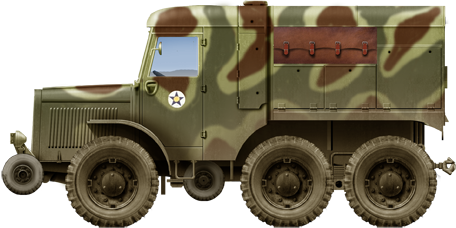
 Laffly S 35 T (1937)
Laffly S 35 T (1937)
24.08.2024 The Laffly S 35 T emerged from a 1935 specification calling for a heavy 6x6 prime mover capable of towing all hevay artillery pieces in the French inventory, notably the ubiquitous 155 mm GPF modele 1917 and 155 mm Howitzer modele 1917. Laffly delivered a ladder-type 6x6 vehicle with a 4-cyl. Otto petrol engine capable of 40 kph on all terrains thanks to its unditching small wheels, winch and spade. 225 were delivered from 1937 to 1940 and it was declined into a recovery vehicle, an armoured transport and an aircraft engine starter vehicle. Ther German captured many and had Laffly delivering from parts 83 more in 1941. It was integrated in the Werhmacht as the Schwere Radschlepper laffly S 15T(f).
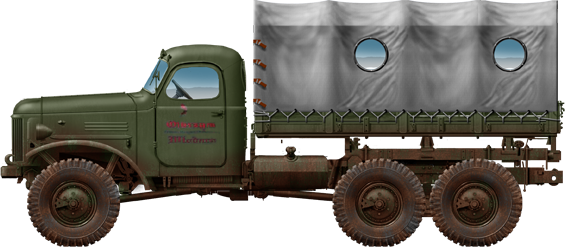
 ZIL-157 (1958)
ZIL-157 (1958)
18.08.2024 The ZIL-157 is a Soviet and Russian medium-tonnage truck with increased cross-country ability manufactured by the Likhachev Plant (ZIL). The ZIL-157 was mass-produced since 1958, mainly for the both Civilian needs and Armed Forces. Its cab a repeat of the ZIS-151's with minor changes. In time, the mass-produced ZIL-157 appeared soon obsolete and subsequently replaced in the 1970s by the ZIL-131 and Ural-375. A total of 797,934 in all modifications were produced, making it the largest Soviet truck production after the WW2 U7 (Based on the lend-lease
Stubaker US6). Created at the end of 1954, production started in 1958 and ended in 1991, IL stopping in 1978) and Novouralsk taking on. But the very last were made in 1994 in specialties. The antiquated, basically WW2 Soviet comfort cabin was improved in between with heater and an electric fan powered by the engine cooling system whereas suspension shock absorbers were improved. Despite of this, it's jarring to imaging this copy of the 1942 US6 was basically produced unchanged until after the end of the cold war... Note: As the subject is huge, expect updates in the future and one-offs (like the 157K tractor for the S-125 SAM trailer)...

 Scammell Pioneer TRCU
Scammell Pioneer TRCU
10.08.2024 The Scammell Pioneer was also declined into a tank transporter from 1932 when first tested, called TRCU-20. Production really started in 1937 with a grand total of 527 made until 1945, including 459 of the 30-tons TRCU-30 variant and the interwar 68 TRCU-20s. They served on all fronts from north africa to Italy and Europe, but with their tall trailer they were unable to cross under many bridges when carrying the tall Sherman and started to be replaced from 1941 by the Diamond tank transporter, which was capable of handling the heavier Churchill also.
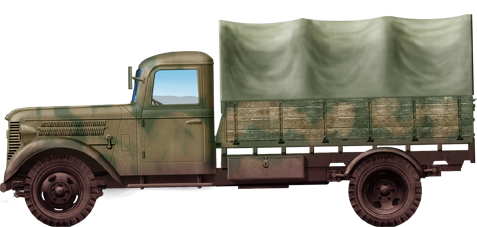
 Nissan 180
Nissan 180
03.08.2024 The Nissan 180 truck was manufactured from 1940 for the Imperial Japanese Arrmy (introduced 1941) as a 2x4, rear transmission 2t ton truck. It is just so ellusive that comprehensive data is just missing for a full article. So it's an entry on the main W2 IJA softskin vehicles page, alongside the Nissan 80 COE, Isuzu Type 94, Tokyu Kurogane Type 95 minitruck, or Type 97 4WD truck, same category as the Nissan 180.
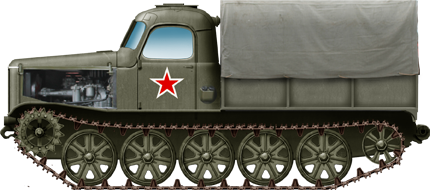
 AT-L
AT-L
27.07.2024 Artilleriyskiy Tyagach Lyogkiy, or AT-L (Russian: Артиллерийский Тягач, Лёгкий (АТ-Л), meaning light artillery tractor) was a Soviet Cold War era artillery tractor. The vehicle has the same cab as the ZIS-150 and ZIL-164 trucks, but has a different front end and grille similar to that of the GAZ-51 truck. Perhaps c1500 were manufactured in AT-LA and AT-LM versions until 1967, and they stayed in service until 1975.
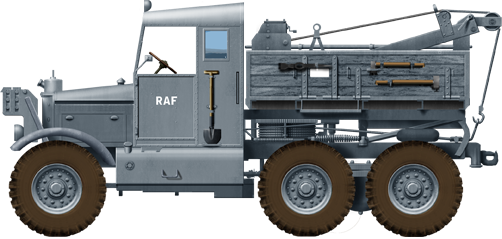
 Scamell Pioneer SV1S/T
Scamell Pioneer SV1S/T
21.07.2024 From 1936, the British Army started to receive 43 Pioneers SV1S heavy recovery vehicles. Many of these SV1S and R100 vehicles were lost in France in June 1940, destroyed by withdrawing troops or captured by the Germans. The SV2S version had a redesigned crane with greater lifting height, introduced in 1938. A total of 1,975 SV2S were built. Delivery of a tank transporter began in 1937. This variant was fitted with a longer chassis for an extended cabin to accommodate the tank's crew and 459 of this sub-variant were produced...
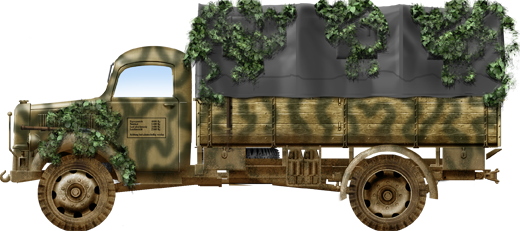
 Borgward B3000 (1938)
Borgward B3000 (1938)
14.07.2024 The Borgward B 3000 was a medium-sized truck made by German manufacturer Carl F. W. Borgward GmbH between 1941 and 1944 in the Bremen-Sebaldsbrück works. After World War II, B 3000 production continued from July 1948 to 1950. In all, c30,000 were manufactured of all six versions, not counting the postwar ones, until 1944 when both Borgward factories were completely destroyed by air raids. There was also an electric version named Borgward BE3000.

 9K720 Iskander
9K720 Iskander
07.07.2024 The 9K720 Iskander (NATO SS-26 Stone) is a mobile short-range ballistic missile system produced and deployed by the Russian army from 2006 and also exported. Each 9P78 TEL carried two ballistic missiles (terminal hypersonic speed Mach 7.6, 50 km alt, range 500 kilometres) each. This was the replacement for the OTR-21 Tochka but only a few were built unlike the latter. The vehicle also saw action Ukraine recently.
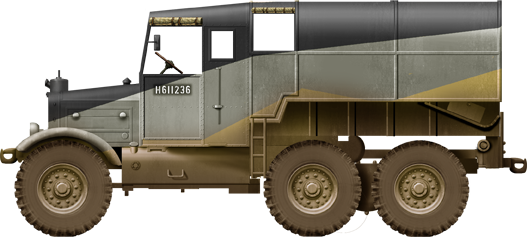
 Scammell Pioneer R-100 (1935)
Scammell Pioneer R-100 (1935)
29.06.2024 The Scammell Pioneer was one of the primary tractors of the British Royal Army before and during WW2. It was used in three roles: Artillery tractor (primary), recovery vehicle (secondary) and tank transporter (tertiary). In the latter role this was practically the only one before its replacement by the Thornycroft Antar in 1952, and before the arrival of lend-lease M19, Mack, Diamond and others heavy duty semi-trailer tractors of flatbed trucks. Despite only 3400+ were built, they proved dependable, had solid output and off-road capablities, and soldiered from the BEF in France in 1940 to the last days of the war in the far east in the summer of 1945. Some even lingered in other roles until the late 1950s. This is the first part of the three parts article studying the different variants of the Scammell Pioneer.

 Renault TRC-36R (1939)
Renault TRC-36R (1939)
22.06.2024 Also called Renault YCR, this little tracked tractor was designed as a supplier like the
Renault UE (1932) and based on it's chassis, for resupplying Tanks (TRC stands for "Tracteur de Ravitaillement pour Chars") with a 2.1L 38hp 4 cyl. Renault engine, full metal cab for a driver and co-driver as well as a rear flatbed, towing the same UK trailer. Like the UE, many fell into German hands, in which they served as the Frz. Vollkettenschlepper Renault 36R. It was manufactured until 1942, for the Vichy Army.
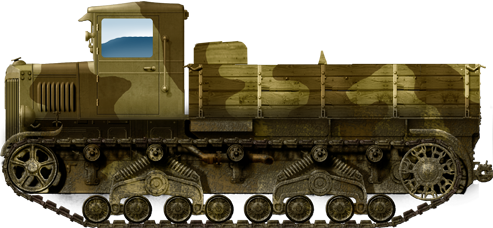
 Voroshilovets (1939)
Voroshilovets (1939)
15.06.2024 The Voroshilovets is a World War 2 era tracked prime mover of Soviet origin. It was developed in the late 1930's as a more powerful alternative to the Komintern prime mover. The tracked chassis was very useful in the Russian climate with knee-deep rasputista mud in the spring and snow in winter. It was also the first near-COE (cab over engine) model, the most powerful in terms of towing power and still carried 16 infantry in flatbed and 3 in the cabin. 1123 were made from 1939 until 1942 when production was terminated.
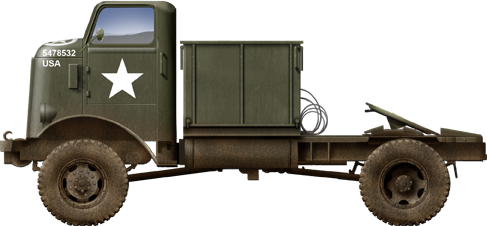
 Autocar U-8144-T
Autocar U-8144-T
08.06.2024 D-Day special ! The Red Ball Express was at first covered by the famous "Jimmy" (CGC 353) which had a ring mount for self defence, but as war progressed and roads became more secure, new styles of heavier military haulers and tractors started to appear. Autocar was one such company that delivered an impressive COE (Cab over Engine) namely the U-7144-T & U-8144-T Tractor Trucks. They were practically identical to the vehicles made by White and federal and together in August 1945, they represented a total of 21,974 very similar COE heavy duty tractors. With their large utility trailer that could carry anything from fuel tanks to landing crafts, pontton, aircraft, and every supply in between...
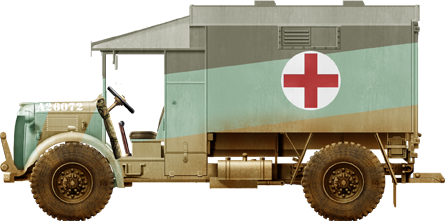
 Austin K2/Y
Austin K2/Y
01.06.2024 The Austin K2/Y is a British heavy military ambulance that was used by all Commonwealth services during the Second World War. Built by Austin, it was based on the 1938 Austin K30 30-cwt light truck which, as the K2 chassis, was built during the war for many uses.
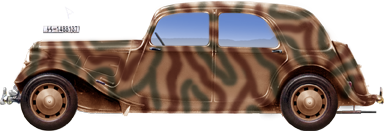
 Citröen Traction Avant (1934)
Citröen Traction Avant (1934)
25.05.2024 Although the Citroën "Traction Avant" is certainly not a military truck, it was however one of the most common and recoignisable French vehicle in 1940. It was used by the French Army, German Army and SS, Vichy state Milice, Gestapo, FFI under the occupation and the allies at the end of the war. It was the go-to vehicle here and then, innovative, modern, stable and fast. Not armed (by default) it was used as a liaison, staff car, VIP transport, and just became ubiquitous in France in WW2 and up to the mid-1960s, albeit eclipsed by the famous DS.

 SPA AS.37 (1937)
SPA AS.37 (1937)
18.05.2024 The SPA AS.37 was an Italian military light truck of World War II. It was developed from 1937 based on the
TL.37 artillery tractor and tailored to carry a crew of three and payload in the North African desert. Compared to the tractor, it had an increased range of 900 km with added water tanks and its total capacity was up to 8 men between its flatbed and cabin. About 802 were manufactured (the Production went from 1938 to 1943), and it was declined into the
Autocarro Protetto 37 light armoured personnel carrier variant (200 built, Balkans-Italy). The AS 37 Sahariano was also declined into an heavily armed vehicle.
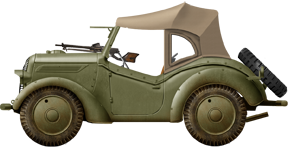
 Type 95 Kurogane
Type 95 Kurogane
11.05.2024 Certainly among the cutest military vehicles of WW2, the little Kurogane was designed in 1934 for the Imperial Japanese Army as a scout car by Tokyu Kurogane Industries, and some 4,700 were manufactured from 1936 to 1944. It mostly served in China but also took part in the Burma and Philippines campaign among others. Above all, it was one of the world's first four-wheel drive compact car to be mass produced before the Jeep. It existed in 2-door roadster, 2-door pickup truck and 4-door phaeton variants.

 ZIL-135
ZIL-135
04.05.2024 The famous ZIL-135 family started in 1959 and was produced up to 1993 mostly by BAZ at Bryansk. This was the quintessential four axle heavy duty multpurpose military truck designed in USSR to carry heavy payloads which standard 1950s trucks could not do. The ZIL-135 which changed appareance between the K and L/M main versions had originally two engines, no suspensions, fwd and rear steerable axles and a drive system passing torque to the four wheels on one side at a time. One of the most famous derivative was the Luna-M missile TEL, or the BM-27 Uragan we just saw. This is the first of a serie of articles on this family. Illustration: the relatively confidential ZIL-135MP flatbed truck variant.

 Land Rover 2a LWB SAS
Land Rover 2a LWB SAS
27.04.2024 The famous "Pink Panther" was a worthy inheritor of the WW2 LRDG (Long Range Desert Group). They were narrowly linked to the SAS or Special Air Service, an airborne commando unit widely considered as the ancestor of special forces today. Only 74 vehicles were built by Marshall's of Cambridge from 1967 and it was delivered from 1970, used until replaced by the Land Rover Defender 110.

 F.N. AS 24 "tricar/trike"
F.N. AS 24 "tricar/trike"
20.04.2024 The Belgian Fabrique Nationale AS 24 was a Motorized utility Tricycle for transport, collapsible to be paradropped in airborne operations, used until 1983. It was to be dropped together with the paratroopers in airborne drops, and some 463 AS 24 were manufactured, plus at one or more prototypes. It was decommissioned starting in 1984 and up to 1990 at the latest. It's battle records included notably several operations in Congo (Zaire), notably Operation Dragon Rouge, a hostage rescue mission in Kisangani on Nov 24-27, 1964, where it proved intrumental..
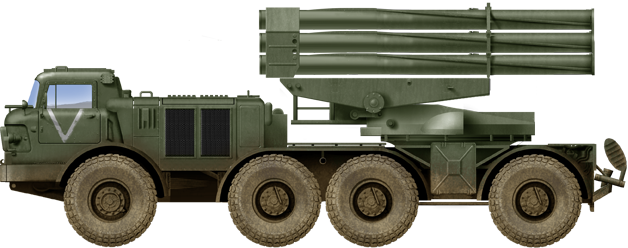
 9P140 Uragan
9P140 Uragan
13.04.2024 The BM-27 Uragan ("Hurricane", GRAU index 9P140) is a self-propelled 220 mm multiple rocket launcher (SPRL) designed in the Soviet Union, specifically to deliver cluster munitions from large 220 mm rockets. It entered service from 1975. For the first time, a rocket launcher vehicle, long derivative of the famous WW2 Katiusha, is able to deliver a spin and fin stabilized rocket. The vehicle was designed and manufactured by Splav State Research and Production Enterprise on the base of the dependable ZIL-135 8x8 prime mover already made famous by carrying the SCUD across the world. Like many other versions of the ZIL-135, the BM-27 Uragan was exported to some 19 countries, was licence-built and derived and found a lot of action in a dozen of wars and conflicts, and this story is not over. The improved Uragan-1M commissioned in 2008 is its designed successor.
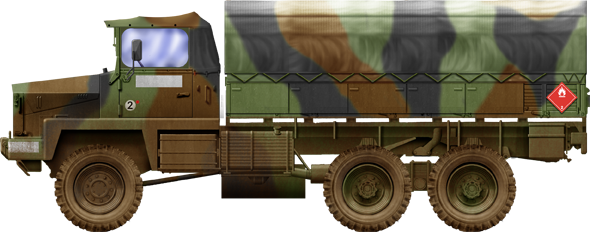
 Berliet GBC 8 TK (1965)
Berliet GBC 8 TK (1965)
07.04.2024 The Berliet GBC was developed in 1958 as a new type of all-terrain 6x6 truck aimed at the oil industry and desert conditions. For this was created the prototypes GBC Gazelle which took part in an expedition, the "Missions Berliet-Tenere". The success proved the type was indeed well suited, and the Army, which had a specification to replace the venerable WW2 GMC CCKW and wanted a model fit for the conditions in Algeria, ordered it. The military variant was done to NATO standards of the time as the GBC 8 TK. 35,000 in all variants were delivered to the French Army, making the bulk of its cold war troop and supply transportation assets until the 1990s. The last were still modernized to extend their sevrice life for another decade. It was also licence built in China and Portugal (As the Tramagal).
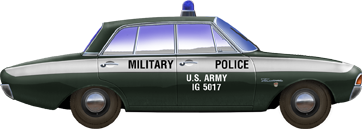
 Ford Taunus (1963)
Ford Taunus (1963)
31.03.2024 The Ford P5 was the 5th postwar model of the Taunus by Ford Germany (also made in Portugal and Belgium), a lineage started in 1939. The model came out with the 17M, a range of 4-cylinders and the 20M mostly in sedans, powered by a V6. The latter was cheap and popular by the performances it offered. It was adopted by the West German Polizei for patrols and pursuit, the fire brigades, but also the US Army Constabulary Force in Berlin, to conduct military police patrols.
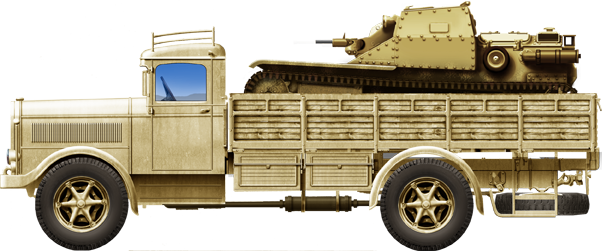
 Fiat 634NM (1933)
Fiat 634NM (1933)
23.03.2024 The Fiat 634NM was an Italian heavy truck ("Gigante") produced by Fiat Veicoli Industriali and nicknamed "Elefante". It existed first in the civilian service, and was soon modified to be adopted by the Italian Royal Army. Thousands were used by the Royal Army in WW2 where they performed a large varieties of duties on the battlefield, from troop to tank transport, supply and declined as self-propelled guns, often rearmed with older Regia Marina guns as portee for the North African Campaign.
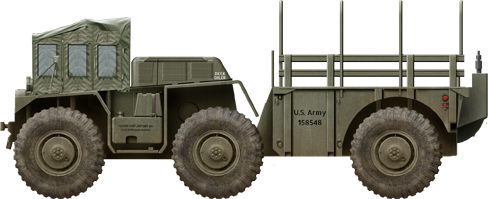
 Chance vought M561 1+1/4-ton 6x6 "Gama Goat" (1969)
Chance vought M561 1+1/4-ton 6x6 "Gama Goat" (1969)
17.03.2024 The M561, commonly known as the "Gama Goat," is a six-wheel drive amphibious vehicle developed by the United States Army in the late 1960s. It was designed to be used for a variety of purposes, including cargo transport, troop transport, and weapon platform. Made by Chance Vought and produced from 1970, it was powered by a Detroit Diesel 3-53T 3-cylinder, 2-stroke diesel rated for 175 horsepower with a selection of 2 or 6-wheel drive. The unique articulated design allowed an unprecedented mobility on the worst terrains. However this machuine had issues. Arrived in the dying days of US presence in Vietnam, it was difficult to maintain and repair.
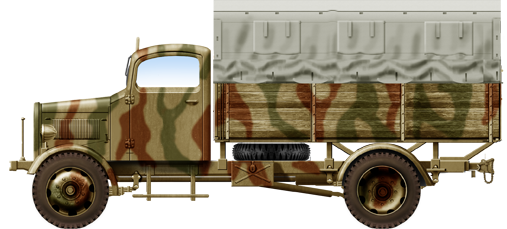
 Mercedes L3000 (1938)
Mercedes L3000 (1938)
10.03.2024 The Mercedes-Benz L3000 was the second most common German truck after the Opel Blitz in World War II. Primarily used as a military transport this was a L3000 was a medium-duty truck with three tons payload hence the "3000". It was powered by a diesel engine and featured a robust chassis suitable for various configurations, including cargo and troop transport, as well as a flatbed for mounting artillery or anti-aircraft guns. During the war, the Mercedes-Benz L3000 played a significant role in the logistics and transportation needs of the German military, being used extensively on various fronts. After they were repurposed for civilian use, scrapped or captured as war booty by Allied forces.
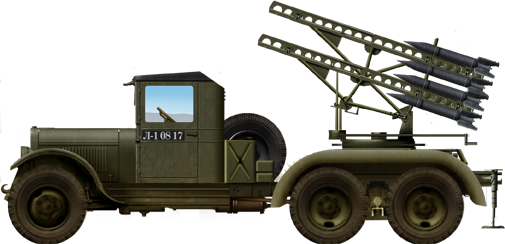
 BM-13 Katyusha (1940)
BM-13 Katyusha (1940)
02.03.2024 The BM-13 Katysusha is probably the best known model of the cohort (100,000) of self-propelled rocket launching systems developed by the Soviet Union from the late 1920s to late 1930s experimentally, fielding its first batteries in the July 1941 defense and being decisive on the December 1941 campaign of Moskow. More than 500 batteries ranging from 4 to 12 truck each were fielded in 1945 and the type was furthjer developed and used in nearly all major conflicts of the cold war to this very day in modernized forms. This article tackles the development and combat use, variants and various truck platforms of the system.
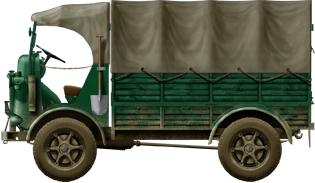
 Fiat SPA CL-39 (1939)
Fiat SPA CL-39 (1939)
22.02.2024 The Fiat SPA CL-39 was designed as a more modern light lorry to complement the mountain truck, SPA OM series. It was largely produced and used on all fronts from Russia to the Balkans and North Africa. It's only variant was the Colonial version which had air conditioning, and the option of artillery tyres or regular pneumatics. With 5640 built until 1944 it became the most widespread of light lorries, distributed among mortar, howitzer, antitank and AA companies, used by the Regia Aeronautica as well.

 Scania T112 (1981)
Scania T112 (1981)
10.02.2024 The Scania T112 is part of the 2-series family developed from 1980 to 1989. This post is about the T112 bonneted (conventional) cab semi-tractor variant used for towing a variety of trailers, notably for military use, like a ballistic missile or a tank.
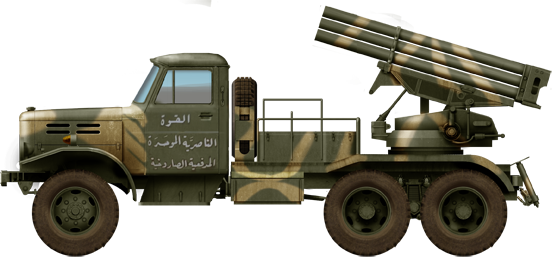
 Isuzu TSD-45 and HTS 11/12 (1960-80)
Isuzu TSD-45 and HTS 11/12 (1960-80)
03.02.2024 This post is double due to the scarcity of information on the North Korean HTW 12G Copy of an Isuzu truck, exported as the BM-11 rocket launcher system. The post is also about its 1970-80s successor for the JSDGF, the Isuzu TSD-45. I hope to complete information as the time goes and split both articles in the future. The BM-11 was carried by other vehicles like the North Korean Jiefang CA 30 copy.
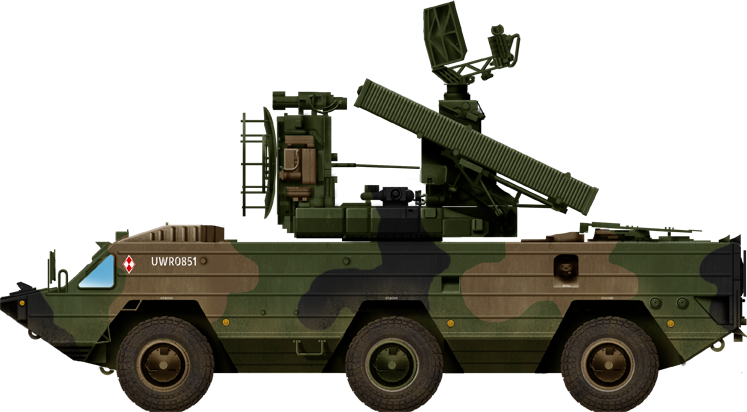
 9K33 OSA
9K33 OSA
27.01.2024 The 9K33 is a weapon system associated with a prime mover family by BAZ, the BAZ 5937, BAZ 5938 and BAZ 5939. In service by 1971 but developed from 1960 onwards until 1972, the 9K33 complex "wasp" (OSA) or NATO SA-8 Gecko, was the main low-altitude, short-range tactical surface-to-air missile system, organic to Soviet frontline motorized divisions. 1,200 were made on a modified BAZ-5937 chassis until 1988, with upgraded missiles. It was based on a 6x6 OSA-AKM amphibious truck (TELAR 9A33B, then TELAR 9A33BM2/3). It saw action in Lebanon (by Syria), Angola, Iraq, at the Russo-Georgian war of 2008, 2011 Lybian civ. war, Yemeni civ. war, in Nagorno-Karabakh, and Ukraine recently (15 lost). Poland and Belarus both developed their own variants.
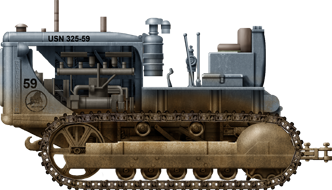
 Caterpillar D7
Caterpillar D7
20.01.2024 The M1 Heavy Tractor was a generic Army type of tracked utilitarian vehicle dedicated to work teams in the field. The most common model by far with over 50,000 built was the superlative Caterpillar D7, a "classic" launched in 1938 and still in use today (last iteration 2020), going through multiple variants. It was used by army engineers and seabees of the Navy virtually on all the world's fronts where the allies fought throughout WW2. They were used as artillery tractors, and declined into bulldozers, tiltdozers and angledozers with specialty kits made by Letourneau or LaPlant-Choate Trailbuilder. Some were even armoured to face the most adverse combat conditions.
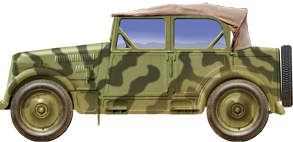
 Fiat 508 CM
Fiat 508 CM
13.01.2024 As with the Aprilia, the FIAT 508 Torpedo Coloniale also derived from a production car, the 508 C, better known as "Balilla". The 508CM was mainly used as staff car in North Africa. Robust, it was also suitable and used for off-road reconnaissance with higher axle ratio and larger tires (6.00 x 16) slightly longer chassis but greater weight at 1,200 kg. It was an interwar precedessor of true utility 4x4 vehicles such as the Jeep 3 years later. The CM was produced to around 6,000 vehicles and remained in service until 1960.
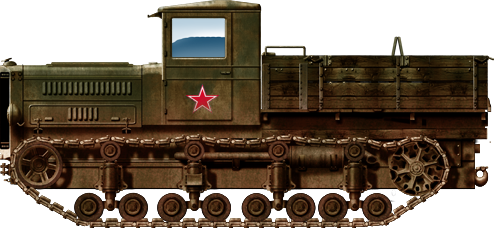
 Komintern Tractor
Komintern Tractor
08.01.2024 Searching for a new heavy artillery tractor in the early 1930s, officials of the Red Army combined the suspension the T12 tank, combined with a ZiS-5 truck cabin. The result was called the "Komintern" tractor powered with a 131 hp 4-cyl. engine for 30 km/h, 220 km range and able of towing the 18 ton B-4 howitzer and a whole range of heavy ordnance. In 1940 production ceased after c1,800 delivered, and replacement by the more modern Voroshilovez.
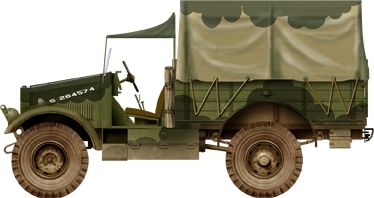
 Morris CS8
Morris CS8
02.01.2024 The Morris Commercial 4WD 15 cwt CS8 was the most prolific light truck of the British Army in 1939. The prototype was built in 1934 as the British War Office had a need for a general purpose vehicle (15 cwt capacity). It was done quickly, reusing many parts from the 1933 civilian C series range. The acronym CS8 wad composed of "C" for Morris (Army code), "S" for 6 cyl and "8" for 8ft wheelbase. It had innovations like its short stubby appearance, high ground clearance, semi forward control layout for a larger than usual cargo area. The army in 1939 selected it as the 15 cwt "general purpose" truck ordered en masse to Guy, Bedford, Commer and Fordson. This range soon became the backbone of the British army until 1942-43 when new models were introduced.
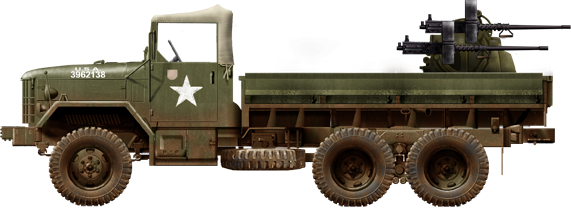
 M35 series 2½-ton 6×6 cargo truck (1950)
M35 series 2½-ton 6×6 cargo truck (1950)
25.12.2023 Xmas Special ! - Probably the most important and best known US military truck of the cold war was the Superlative M35. This iconic universal 6x6 heavy truck was manufactured by dozens of US companies, soldiered on all fronts and for all forces from the US Army, USAF, USMC as well as for NATO allies and wildly exported as well. A true legend, which production and design started at Reo, and went on through the M35A1, M35A2, M35A3 until 1999. The last in the US were those of the National Guards, retired in the 2000s.
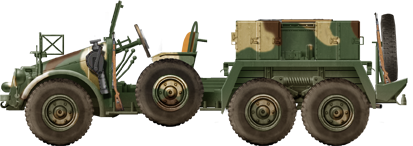
 Krupp Protze
Krupp Protze
18.12.2023 Another axis trucks of WW2 that was quite famous, was the sole light 6x4 lorry of the Wehrmacht, the 1934 Krupp Protze. An artillery tractor produced between until 1941 to 7,000 examples, it was heavily used in World War II. Known also as the Kfz 69 and Kfz 70 it served on the Eastern Front, North Africa, France and Sicily. But it had a high consumption compared to the frugal Opel Blitz and production stopped in 1942.
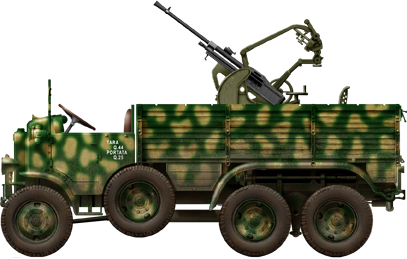
 SPA Dovunque 35
SPA Dovunque 35
12.12.2023 The SPA 35 was an Italian army light off-road truck by S.P.A., used both by the Royal Italian Army and Regia Aeronautica in the interwar, WW2 as well as postwar. Produced from 1935 to an unknown numbers, until 1948, the last were used in 1950 by the Army, after which it was passed onto civilian service. An extremely reliable, albeut old-fashioned vehicle it was delined into multiple variants, including the Breda SPAA and Blindato APC in 1943.

 Citroën-Kégresse P17 (1929)
Citroën-Kégresse P17 (1929)
08.12.2023 With more than 1,440 manufactured by Citröen, the P17 was by far the most common light artillery prime mover half-track of the French Army in 1939. It had a patented, famous Kégresse flexible track system tested already since 1910 in Russia and developed along multiple models. The P17 was notably used for towing the 25mm, 47mm and 75mm antitank and field guns of the French Army, filling an important part of the motorized divisions. The type was also used in Poland in 1939. An armored variant, the
Schneider P16, reused many elements.
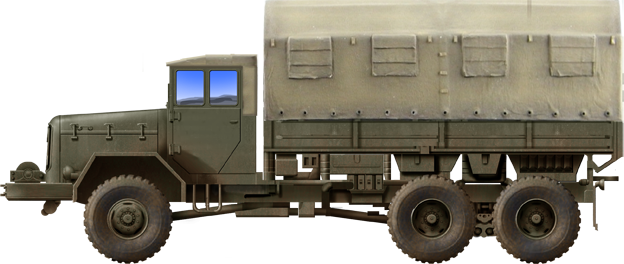
 Magirus-Deutz Jupiter (1960)
Magirus-Deutz Jupiter (1960)
04.12.2023 Among the three major German manufacturers that procured the young Bundeswehr its standard military trucks were MAN, Mercedes and Magirus. The latter was the famous Jupiter, a 6x6 inspired by NATO standards based on the CCKW and legendary M35. The Jupiter was declined into multiple variants including the armoured rocket launcher RakArtBtl 122. 7800 were made until 1967 (renamed Magirus M178 D15 in 1964). They served until the end of the cold war, many having a new life into civilian service and government's agencies.
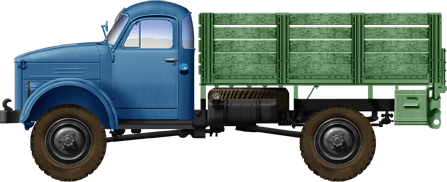
 GAZ-51 (1946)
GAZ-51 (1946)
30.11.2023 The GAZ-51 is the complementry piece of the GAZ-63 seen earlier. The latter was a 4x4 version of the former, a front-wheel drive light truck used in equal measure by the army and civilian sector. The GAZ-51 had a long development time going back to 1937 and which production, approved in 1941, was interrupted by the war and resumed in 1944-45, with many revisions, integrating tech from the Soviet built Studebaker US-6. With about 2,000,000 built from 1946 to 1950, ut rapidly became a standard, also licenced-built in Poland as the Lublin 51 and North Korea.
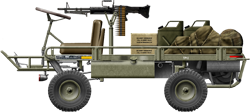
 M274 Mechanical Mule
M274 Mechanical Mule
25.11.2023 The M274 "mechanical mule" was an attempt in 1949 to provide troops with a light transporter which could be air dropped from any helicopter in the field. Called "M274 ½-ton 4×4 utility platform truck", some 11,240 were built from 1956 to 1970. Powered by a tiny Willys petrol 13 hp it was still capable to carry a heavy load, at soldier's pace. They notably served extensively in Vietnam and in the 1980s, before being replaced by the HMMWV and by the more comparable M-Gator in the late 1980s.
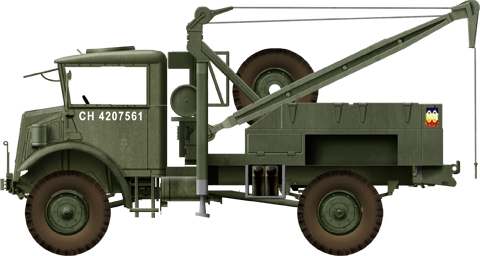
 CMP Ford F60S/Chevrolet C60S (1940)
CMP Ford F60S/Chevrolet C60S (1940)
19.11.2023 Canadian Military Pattern, Part VI. The 60 cwt payload (3 tons) truck was also declined into the C60S and F60S, on short wheelbases, but not the same. The Ford model was even shorter. Their advantage was to keep better engines than the previous C30/F30 and stronger components in general. They were mass-produced as well until 1945 and declined into multitude of variants, some being seen there.
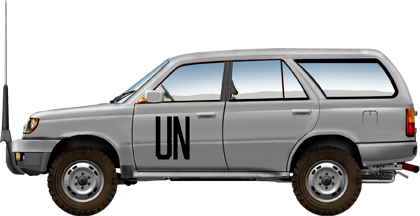
 Toyota land cruiser Prado (1984)
Toyota land cruiser Prado (1984)
11.11.2023 The Toyota Land Cruiser, especially the J70 in its pickup variant had been for decades (and still is) a legendary "technical". However aside bellicose uses, police forces, non-government agencies such as the UN also uses modified versions of standard J70(1987) and J90 Prado for peace keeping and humanitarian missions.
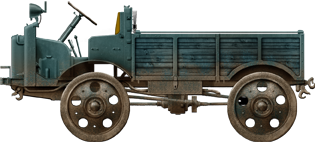
 Autocarreta OM 32/35/36/37 (1929-1942)
Autocarreta OM 32/35/36/37 (1929-1942)
07.11.2023 This small 4x4 lorry was asked for by the Italian Royal Army to be usable on the narrow mountain tracks usually used by mules, reflecting the experience of WWI in the Alps. After a competition, the 1929 prototype from Ansaldo was refined as the OM.32 after being transfered to the state O.M. (Officine Meccaniche) of Brescia. It was at first used in Africa, leading to refinements and the OM 35, then the OM 36 and its troop carrier variants, OM 37 and finally a railway truck variant used in WW2 in the Balkans...

 OTR-21 Tochka (1976)
OTR-21 Tochka (1976)
♆ 03/11/2023 The OTR-21 Tochka (Tactical Operational Missile Complex "Point"') is a Soviet NBC protected amphibious tactical ballistic missile TEL (GRAU designation 9K79, NATO SS-21 Scarab). One missile is transported per vehicle, raised prior to launch, using an inertial guidance system. It started to be replaced from 2020 by the 9K720 Iskander.
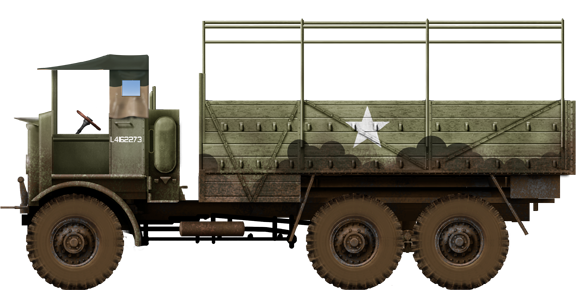
 Leyland Retriever (1939)
Leyland Retriever (1939)
30.10.2023 The Leyland Retriever was a 6x4 truck by Leyland Motors in 1939, used by the British Army in WW2. It was powered by a 6-litre, 4 cylinder overhead camshaft petrol engine. One became the caravan HQ of Bernard Montgomery and in 1940, on its chassis was developed the armoured truck Beaver-Eel used by the RAF in WW2.
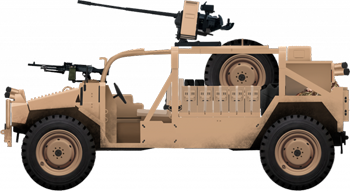
 Alvis Shadow OAV (1998)
Alvis Shadow OAV (1998)
27.10.2023 Built in a partneship between the USA and UK, two prototypes of the Alvis Shadow ‘Offensive Action Vehicle’ were manufactured for testings, as an attempt to replace the
Land Rover in British service and on export. The venerable vehicle indeed reached the end of production in 1985, and was never really replaced. As a private venture, Alvis partnered with AM General to produce such vehicle. Designed mostly for special forces operations, the vehicle was first shown publicly at the Eurosatory in June 2000. However in 2002 Alvis bought Vickers Defence Systems from Rolls-Royce but by 2004 they ended in British Aerospace (BAe Systems), and since the vehicle was competitor for other home vehicles, the program was cancelled. An article of Tank Encyclopedia.
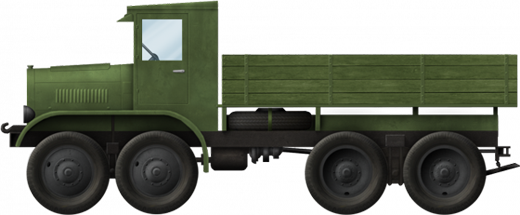
 YAG-12 (1932)
YAG-12 (1932)
23.10.2023 The 1930s saw the Soviet military start to take a mature approach regarding mechanization, but it was industrially far behind, especially considering their large army. Mass production of simple trucks such as the ZiS-5 and GAZ-AA was not enough, and a heavier truck was needed. One of these was the YaG-12, essentially a YaG-10 truck with 8×8 wheel drive. A single prototype was built, tested, and shown at the October Revolution parade in 1932. Although a capable machine, the factory’s low production capabilities, the truck’s high price and the maintenance cost, as well as the military’s desperate need of simpler trucks, cut the project short. An article of Tank Encyclopedia.
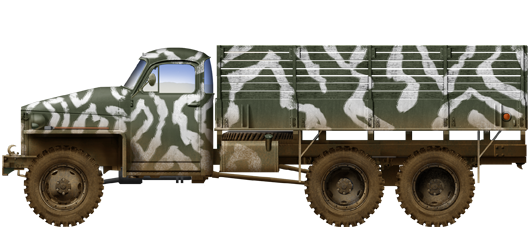
 Studebaker US6 (1941)
Studebaker US6 (1941)
21.10.2023 The Studebaker US6 is one of the iconic WW2 allied trucks. Not chosen by the US Army over the Chevy CCKW, the Studebaker US6 still envoyed a considerable production of c200,000. Designed in 1940 from the civilian M series to answer a government's specifications for tactical trucks, it was largely distributed through lend-lease, finding its way to the British, Canadians, Australians, Free French or Chinese units, and chiefly to USSR (152,000), which created postwar its first modern trucks, the ZiL-151, 157 and GAZ-51 based on its design. Stalin judged it so good he sent a personal appreciation to Studebaker's boss in 1945...
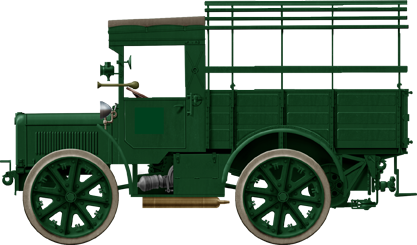
 Breda TP 32 (1932)
Breda TP 32 (1932)
14/10/2023 The Breda TP 32 was a 4x4 artillery tractor made for towing heavy artillery between 1927 and 1934. Although obsolete when WW2 started it was still instrumental as the only suitable tractor for the Cannone da 149/35 and 149/40, howitzers 149/13, 210/22 and 305/17 as well as mortars 260/9. On April 1943 there were still 1,372 in service and it also served with the Hungarian army as only tractor for their 210/22 Ansaldo howitzers. More surprisingly it stayed in service with the Italian Railways until... 1980.

 R380 Hades TEL (1988)
R380 Hades TEL (1988)
07.10.2023 The Renault R380.26 6x4, TSR (Tractor Semi-Trailer), Hades weapon system was a Tansport Erector Launcher (TEL) responsible of the transport and launching of the short-range ballistic pre-strategic nuclear weapon system. The program was tested in 1988 and c30 were fielded, but terminated due to budget restriction in 1992.
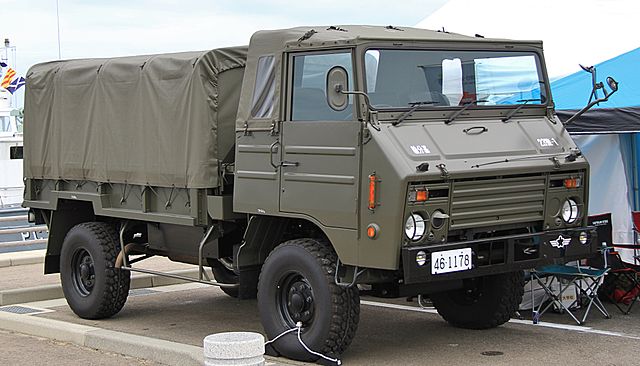
 Cold war and modern JSDF Trucks
Cold war and modern JSDF Trucks
29.09.2023 In preparation for future articles, here is an overview of 1960-2000s cold war and modern Japanese Self Defence Vehicles, some used by the Army, the Air Force and Navy. Tactical medium and heavy trucks, light tactical vehicles, trails and tractors from Hino, Hitachi, Isuzu, Mitsubishi, Nissan, Toyota and Kawasaki.
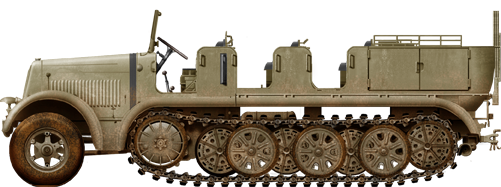
 Sd.Kfz.7 (1938)
Sd.Kfz.7 (1938)
20.09.2023 The Mittlerer Zugkraftwagen 8t (Sd.Kfz.7) was a medium halftrack/tractor/prime mover of the German Army, designed by Krauss-Maffei AG, produced also by Borgward, Bussing-NAG, Daimler-Benz, Saurer Werke and Breda in Italy. Developed in 1933 to 1939 standardized and reaching full-scale production until March 1945 (12,187 produced) it was used on all fronts with all panzerdivisions and declined into nine variants, including two self-propelled FLAK variants, some armoured.
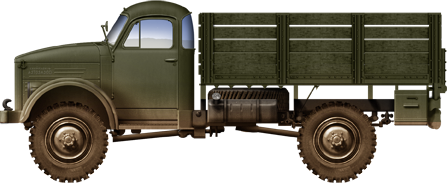
 GAZ 63 (1948)
GAZ 63 (1948)
14.09.2023 The GAZ 63 was a 4x4 military variant of the GAZ-51 based on the WW2 lend-lease studebaker US5 truck. The GAZ-63 was produced until 1968 to c474,000 vehicles in USSR alone. It was declined into 18 versions, exported and later produced in China, Poland and North Korea under licence, it was also used in Hungary, Romania, Syria and Ukraine. Some are still in circulation today.
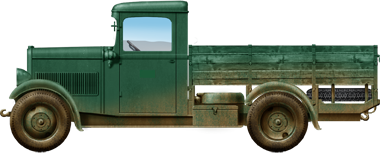
 Fiat 618 C/MC Lorry (1935)
Fiat 618 C/MC Lorry (1935)
07.09.2023 The FIAT 618 was a 4x2 lorry with 1.2ton payload built by the thousands by FIAT SPA, with over 5,000 for the civilian market and some 4,000 for the military, declined into the C for "Coloniale" used in Ethiopia from 1935 and East Africa in WW2. Denied the Libyan theater, they were repatriated home but also soldiered in Spain (some 2,000 sent) and declined into multiple variants, AA trucks, artillery towers, ambulances, workshops, recovery, tankers, and in several services including the Regia Aeronautica. It was also mass produced in Poland by Poslki-Fiat as the PF 618 Grom, seeing action also in many variants in WW2.
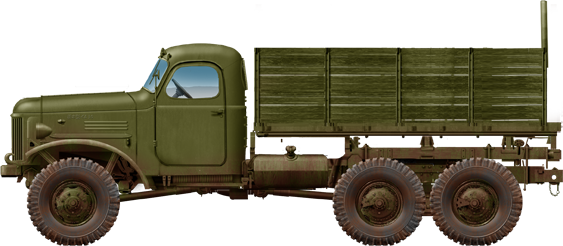
 Jiefang C.30 (1959)
Jiefang C.30 (1959)
01.09.2023 After China established the First Automobile Works (FAW) in Changchun, the Jiefang CA-10 lorry was introduced, followed by the larger CA-30. The latter was developed in the same factory and reused some of its elements, but overall was closer to the Soviet ZIL-157, a 6x6 truck with better overall offroad characteristics. It was produced to very large numbers until the 1980s, ensuring a steady source of transportation to the PLA, seeing action in Vietnam among others (until 1973 vs. US and ARVN, then in 1979 against the NVA). Replaced now by vastly more modern trucks after the opening on China to the West in the late 1970s, it is only still used by some civilian services.
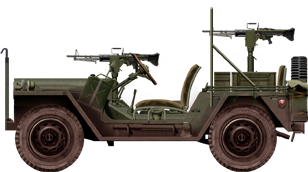
 M151 Mutt (1957)
M151 Mutt (1957)
24.08.2023 The M151 Mutt, known officially M151 ¼-ton 4×4 utility truck was one of the replacements for the WW2 Jeep. It had integrated body, more spacious and an all-around independent suspension with coil springs. 100,000 (1959–1988) were produced, the last for Pakistan. They served for much longer than the GPW, M38, and M38A1, being replaced eventually by the AM General HMMWV, but some M151A2 were still in service by 1999...
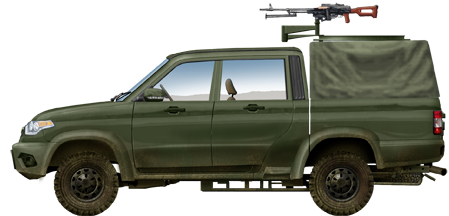
 UAZ 23632-148 Esaul (2018)
UAZ 23632-148 Esaul (2018)
19.08.2023 Based on the UAZ Patriot SUV of the civilian market, a military version called "Esaul" was developed in 2018 at the Ulyanovsk Automobile Plant to be become part of the logistics of the National Guard. It was developed as a successor to the previous UAZ-515195 Esaul, and took part in the 2022 invasion of Ukraine. Exact numbers or exact specifications are subject to caution. It is based on the UAZ Patriot already in border guards, police and special forces of the Russian military and paramilitary. Developed as a pickup version modified to carry a heavier armament, with a CBD armoured cell (reinforced steel) and/or kevlar inserts for the engine and fuel tank. The pickup compartment is modified with a cage bar and ring mount as well as pintles for various ordnance. The type has seen action since 2018 and already six had been destroyed or captured in Ukraine since 2022.

 Ashok-Leyland Hippo TEL (2009)
Ashok-Leyland Hippo TEL (2009)
12.08.2023 The Ashok-Leyland Hippo TEL (Transporter Launcher Erector) is the dedicated platform to carry and operate the Agni II medium range ballistic missile of the Indian Army Today, with the system operational by 2009, and the IIa (later Agni IV) introduced in 2011. Circa 12 are operational by 2017 at the 335 Missile Group at Secunderabad.
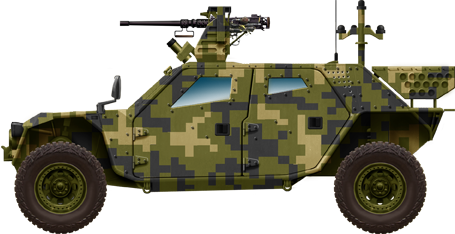
 Rantis P6 ATAV (2016)
Rantis P6 ATAV (2016)
03.08.2023 The P6 ATAV is an Indonesian Light Attack Vehicle manufactured by PT Sentra Surya Ekayaja (SSE Defence). First public appearance dates back from the Indo Defence 2016 exhibition. Now distributed as Rantis (kendaraan taktis — tactical vehicle) by the Indonesian military, it is a light "special operations" quick air-transportable vehicle for the Indonesian special forces, but the c30 built (undisclosed) are also used by the Indonesian Marines, Army and police special forces.
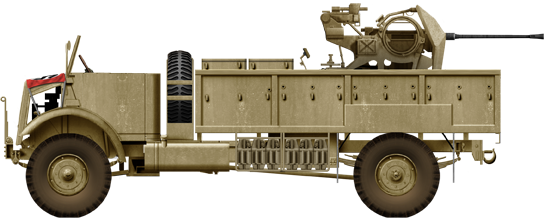
 Canadian Military Pattern, Part V
Canadian Military Pattern, Part V
CMP Ford F60L/Chevrolet C60L (1940)
22.07.2023 The other entry in the line was also the largest, corresponding to the 60 cwt payload (3 tons). This truck came into two main versions, the longwheelbase (seen there) or C60/F60L, and the short ones ("S") seen next week. The were also declined into 6x6 and 6x6 chassis (seen another month) and declined into multiple specialized variants, which will be also developed in the future.
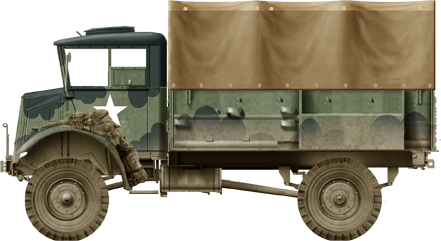
 Canadian Military Pattern, Part IV
Canadian Military Pattern, Part IV
CMP Ford F30 Chevrolet C30 (1940)
14.07.2023 The Ford F30 and Chevrolet C30 or 30 cwt are the medium trucks in the whole CMP line. They had a longer wheelbase, chassis, larger payload of 1.5 tons, but shared all the rest of the components, engine, transmission and cab with the shorter C15/F15. They were also declined into many versions: Wrecker, dumptruck, artillery portee, ambulance, mobile workshop, tank truck...
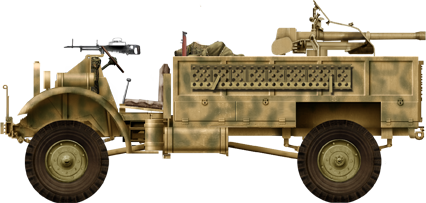
 Canadian Military Pattern, Part III
Canadian Military Pattern, Part III
CMP Ford F30 LRDG (1941)
07.07.2023 The Ford F30 and Chevrolet C30 in LRDG service. These medium trucks with their payload of 1.5 tons, was soon preferred by the Long Range Desrt Group over the smaller and fuel-hungry C15a/F15a trucks. Less well known than the Chevy 1533X2 30cwt of the Jeep, often paired, the CMP 30 CWT also became an indispendable truck. If it was less frugal for its payload than the Chevy truck, the Ford 30 CWT in partcular proved well suite as a gun portee. And soon when not bristiling with machine guns, they were often included in columns with their 37 mm Bofors Antitank Gun.
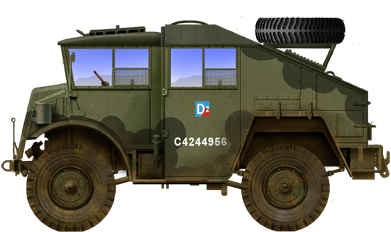
 Canadian Military Pattern, Part II.
Canadian Military Pattern, Part II.
CMP CGT/FGT FAT (1942)
28.06.2023 One of the derivatives of the prolific CMP C15A/F15A 4x4 truck was a dedicated Field Artillery Tractor (FAT). The tailored vehicle had the "beetle-back" body borrowed from the famous Morris C8 "Quad" FAT in 1940. It could carry the gun crew and ammunitions in one go, and either tow the standard British/commonwealth 25-pdr howitzer or the 17-pdr antitank gun when deployed in such bataillons. These CMP CGT (Chevrolet) and FGT (Ford) soldiered from North Africa to Germany in 1942-45.
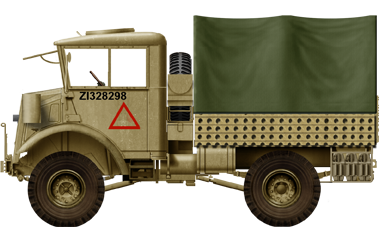
 Canadian Military Pattern - Part I
Canadian Military Pattern - Part I
CMP Ford CMP F15/Chevy C15 (1940)
22.06.2023 The Canadian Military Pattern truck or "CMP" were a class of military trucks of which 400,000 (50% of the total Canadian production) were delivered from 1939 to British Army specifications, widely distributed among British Commonwealth allies. Standard were drawn up in 1938 and producton ran until 1945. Since it's a huge family this post is the first of a serie, starting with the smallest of them all, the Chevrolet C15 and Ford F15 4x2 101" wheelbase or 15 cwt.
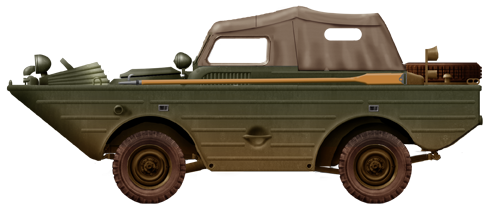
 GAZ 46 (1954)
GAZ 46 (1954)
14.06.2023 The GAZ 46 or MAV-46 was an amphibious 4x4 soviet vehicle made by the Gorky Automobile Plant from 1954-1958 and largely inspired by the German Schwimmvagen and US-built SEEP, largely sent to USSR during WW2 in lend-lease and appreciated far more than the allies, so much it was decided to replicate it, based on the GAZ-69. It was also used by the Warsaw pact and exported, but replaced in the late 1950s and 1960s by a new generation of better protected amphibious armoured vehicles.